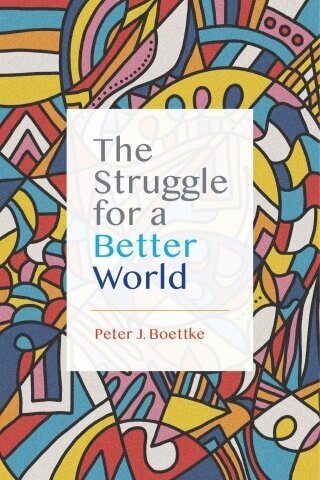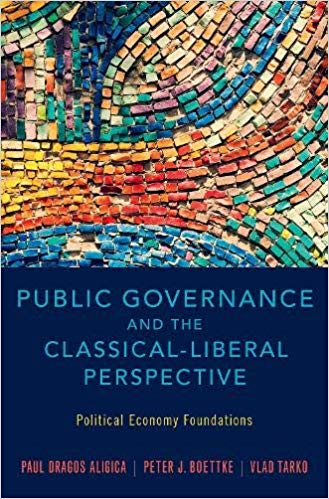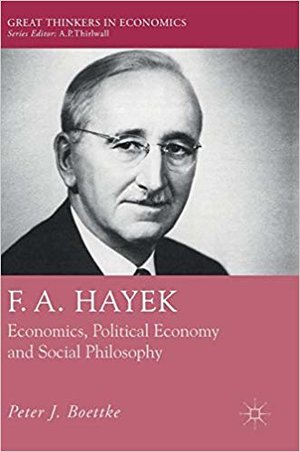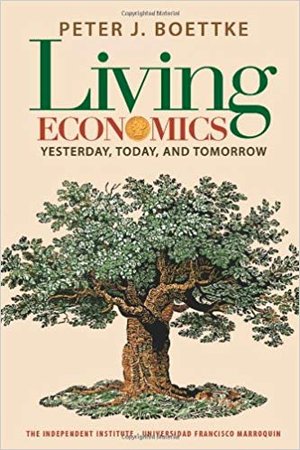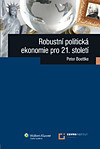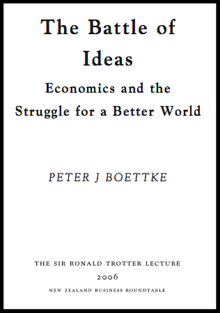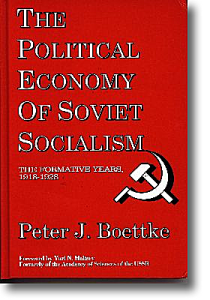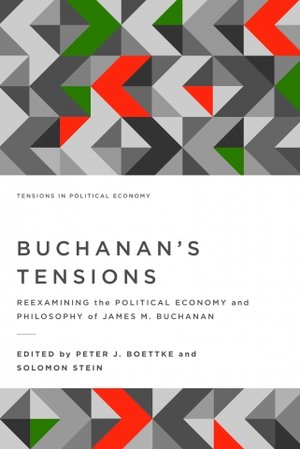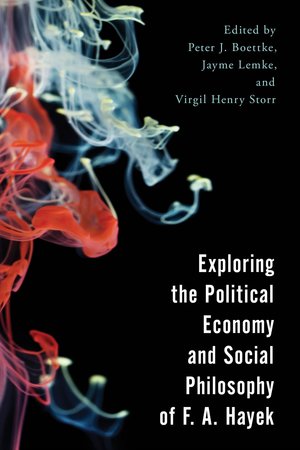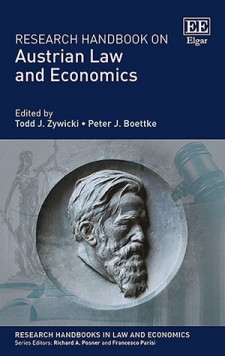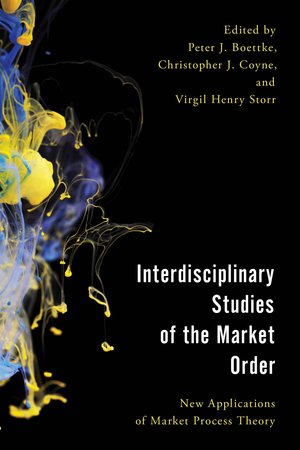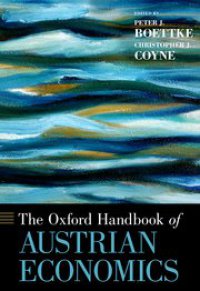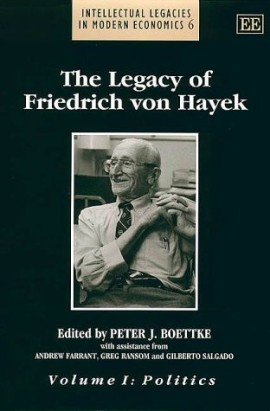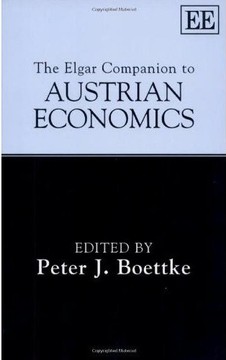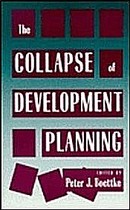Pursuing Research of Consequence
Peter J. Boettke’s research has primarily been in the area of comparative political and economic systems and their consequences with regard to material progress and political freedom, with a particular interest in 20th century economic thought and the methodology of the social sciences.
Much of the suffering throughout the developing world in the 20th century was caused by bad ideas in economic theory and public policy and that these bad ideas were promulgated because of misguided notions in the philosophy of science as applied to the social sciences. It has become an important part of his efforts to explore and tell the tale of this mistaken intellectual path. The Austrian school of political economy, its ideas, historical figures, and fate in the economics profession and public policy discourse has been a source of continued intellectual inspiration for him since his undergraduate days and is no doubt evident throughout all his writings.
Fields of Interest
Market Process Theory, Comparative Political Economy, History of Economic Thought and Methodology, Economic Development, Economic Methodology, Austrian Economics, Political Economy, Informal Institutions
Authored Books
the struggle for a better world, Great Barrington, Arlington: Mercatus center, 2021
In The Struggle for a Better World, Peter J. Boettke explores how the social sciences, and political economy in particular, help us understand society and its institutions of governance. Boettke advances an approach for understanding, articulating, and pursuing a coherent and consistent vision of a society of free and responsible individuals who may prosper through voluntary participation in the market and their communities. In this volume, a collection of addresses, lectures, and papers over the past two decades, Boettke articulates ideas which, if consistently pursued, can help fulfill liberalism’s emancipatory promise to advance human flourishing and overcome adversity caused by economic, social, and political injustice and repression. Boettke advocates for liberal cosmopolitanism, grounded in the principles of equality, justice, and liberty, and the basic recognition that all people are dignified equals, as the best hope for a better world.
Money and the rule of law, Great Barrington, Cambridge: Cambridge University Press, 2021
Contemporary monetary institutions are flawed at a foundational level. The reigning paradigm in monetary policy holds up constrained discretion as the preferred operating framework for central banks. But no matter how smart or well-intentioned are central bankers, discretionary policy contains information and incentive problems that make macroeconomic stability systematically unlikely. Furthermore, central bank discretion implicitly violates the basic jurisprudential norms of liberal democracy.
Drawing on a wide body of scholarship, this volume presents a novel argument in favor of embedding monetary institutions into a rule of law framework. The authors argue for general, predictable rules to provide a sturdier foundation for economic growth and prosperity. A rule of law approach to monetary policy would remedy the flaws that resulted in misguided monetary responses to the 2007-8 financial crisis and the COVID-19 pandemic. Understanding the case for true monetary rules is the first step toward creating more stable monetary institutions.
The Four Pillars of Economic Understanding, Great Barrington, MA: American institute for economic research, 2020
Economists have worked for centuries to present their core lessons to the general public in ways that are accurate and reflective of its true implications for our lives. Great economists, not always in the mainstream, have always known that economics is about the flourishing of human beings and the need for open societies that allow for experimentation, innovation, and the emergence of the order that only liberty can beget.
In The Four Pillars of Economic Understanding, Peter J. Boettke has made a genuine contribution, building on the works of the great minds of the past to provide a new and unique presentation for the current age. This work puts every reader in the position of being Professor Boettke's student and holds the potential to be recognized as a seminal and classic statement concerning the implications of economics for our lives.
Public Governance and the Classical-Liberal Perspective, Bethesda, mD: Oxford University Press, 2019 (With Paul Dragos Aligica and Vlad Tarko)
Classical liberalism entails not only a theory about the scope of government and its relationship with the market but also a distinct view about how government should operate within its proper domain of public choices in non-market settings. Building on the political economy principles underpinning the works of diverse authors such as Friedrich Hayek, James Buchanan and Vincent and Elinor Ostrom, this book challenges the technocratic-epistocratic perspective in which social goals are defined by an aggregated social function and experts simply provide the means to attain them. The authors argue that individualism, freedom of choice, and freedom of association have deep implications on how we design, manage and assess our public governance arrangements.
The book examines the knowledge and incentive problems associated with bureaucratic public administration while contrasting it with democratic governance. Aligica, Boettke, and Tarko argue that the focus should be on the diversity of opinions in any society regarding “what should be done” and on the design of democratic and polycentric institutions capable of limiting social conflicts and satisfying the preferences of as many people as possible. They thus fill a large gap in the literature, the public discourse, and the ways decision makers understand the nature and administration of the public sector.
Order online with promotional code ASFLYQ6 to save 30%.
F. A. Hayek: Economics, political economy and social philosophy, New York: palgrave Macmillan, 2018
This book explores the life and work of Austrian-British economist, political economist, and social philosopher, Friedrich Hayek. Set within a context of the recent financial crisis, alongside the renewed interest in Hayek and the Hayek-Keynes debate, the book introduces the main themes of Hayek’s thought. These include the division of knowledge, the importance of rules, the problems with planning and economic management, and the role of constitutional constraints in enabling the emergence of unplanned order in the market by limiting the perverse incentives and distortions in information often associated with political discretion. Key to understanding Hayek's development as a thinker is his emphasis on the knowledge problem that economic decision makers face and how alternative institutional arrangements either hinder or assist them in overcoming that epistemic dilemma. Hayek saw order emerging from individual action and responsibility under the appropriate institutional order that itself emerges from actors discovering new and better ways to coordinate their behavior. This book will be of interest to all those keen to gain a deeper understanding of this great 20th century thinker in economics.
Login here with your university credentials to access the ebook
applied mainline economics: bridging the gap between theory and public policy, Arlington, VA: Mercatus Center, 2017 (with matthew d. mitchell)
How do human societies work, and how can we make them work better? What methods, ideas, and strategies should we use to help us answer these questions? Economists have more empirical tools—more data and more sophisticated ways of testing those data—than ever before. But unless those who employ these techniques also practice what the authors call “mainline” economic thinking, these new empirical methods are liable to generate more heat than light.
In this book, Matthew D. Mitchell and Peter J. Boettke summarize the ideas of mainline economics. They begin with a puzzle that has vexed economists for more than 200 years: Why are some societies fabulously wealthy while others are miserably poor? They briefly survey the empirical tools that might answer this question and show that this puzzle cannot be understood without grounding the analysis in theory, suggesting that the first place to start is with mainline economic theory. Throughout the discussion, Mitchell and Boettke offer the reader examples of how these tools have helped researchers and policy analysts bridge the gap between ideas and real-world problems.
The Economic Way of Thinking, New Jersey: Prentice Hall (now pearson), 10th ed., 2002; 11th ed., 2005; 12th ed., 2009; 13th ed., 2013 (with Paul Heyne [original author] and David L. Prychitko, preface by Douglass North)
Ideal for those with little or no background in economics, this book provides an in-depth discussion of a limited, but crucial set of economic principles and concepts--then applies these tools of analysis to a wide variety of familiar situations. It develops the basic principles of micro- and macroeconomic analysis, and rigorously employs them as tools rather than ends unto themselves. This book introduces readers to a method of reasoning; to think like an economist—teaching through example and application.
living economics: yesterday, today, and tomorrow, Oakland, CA: The independent institute and universidad francisco marroquin, 2012. Spanish e-book translation, 2013. Romanian Translation, 2013.
The passion of the teacher is often the inspiration for a student. This lively book illuminates how economics affects all walks of life, whether in the marketplace, voting booth, church, family, or any human activity. Boettke believes that economics is not merely a game to be played by clever professionals, but a discipline that touches on the most pressing practical issues at any historical juncture. The wealth and poverty of nations are at stake; the length and quality of life turns on the economic conditions individuals find themselves living with.
So teaching and learning economics are high stakes ventures. Along the way he introduces us to major thinkers: from Smith, Say, and Bastiat of the Classical School, to Neoclassical and Austrian scholars (Menger, Mises, Hayek, Kirzner, and Rothbard) on to New Institutional economists (Alchian, Coase, Demsetz, North, Ostrom and Williamson) and Public Choice theorists (Buchanan, Tullock, and others). This engaging and reasoned book is a must-read for economists, students, and everyone else who wishes to better understand economics.
Institutional Economics: Property, Competition, Policies, 2nd Edition, Cheltenham, UK: Edward Elgar Publishing, 2012 (with Wolfgang Kasper and Manfred E. Streit)
This thoroughly revised, extended and updated edition of a critically acclaimed textbook provides an accessible and cohesive introduction to the burgeoning discipline of institutional economics. Requiring only a basic understanding of economics, this lucid and well-written text will be essential reading for undergraduate and postgraduate students wanting to understand the problems of the real world – such as entrepreneurship, innovation, the cost of the welfare state, international financial crises, and economic development. As institutional economics is now revolutionizing policy making, the book can also serve as a guide to the pressing problems facing policy makers in mature and emergent countries alike.
Robustní Politická Ekonomie pro 21. Století, Prague, Czech Republic: CEVRO Institut Academic Press, 2011
“In this book, Professor Boettke shows a wide range of applications of the Smith-Menger tradition for society's problems. It analyzes the key moments that determined the economics shift from its original base in humanities; discusses the limits of spontaneous self-regulation and rulemaking; maps one of the most important debates in the social sciences 20th century on the possibilities of central planning; demonstrates the need for understanding the economic collapse of the Soviet Union, but also the failure of modern attempts to export Western institutions in the developing world, contributing to the debate on management of jointly owned resources and clarifies the link to the right economics, modern political and administrative science.” - Professor Josef Šima, Rector of the CERVO Institute
Context Matters: Institutions and Entrepreneurship, Now Publishers, 2009 (with Christopher J. Coyne)
This survey explores the important connection between institutions and entrepreneurship. Institutions consist of the formal and informal “rules of the game.” Entrepreneurs act within a context determined by these rules. The rules of the game create payoffs that make certain entrepreneurial opportunities more attractive than others. This monograph explores the relevant literature from institutional economics and entrepreneurial studies, focusing on the important link between the two. Particular emphasis is placed on entrepreneurship within several different institutional settings— private for-profit, private nonprofit, and political—as well as the impact of entrepreneurship on institutions. This monograph concludes by discussing the implications for future research on the topic.
Challenging Institutional Analysis and Development: The Bloomington School, New York: Routledge, 2009 (with Paul Dragos Aligica)
The Bloomington School has become one of the most dynamic, well recognized and productive centers of the New Institutional Theory movement. Its ascendancy is considered to be the result of a unique and extremely successful combination of interdisciplinary theoretical approaches and hard-nosed empiricism. This book demonstrates that the well-known interdisciplinary and empirical agenda of Bloomington research program is the result of a less-known but very bold proposition: an attempt to revitalize and extend into the new millennium a traditional mode of analysis illustrated by authors like Locke, Montesquieu, Hume, Adam Smith, Hamilton, Madison and Tocqueville. As such, the School tries to synthesize the traditional perspectives with the contemporary developments in social sciences and, thus, to re-ignite the old approach in the new intellectual and political context of the 20th century.
The book presents an outline and a systematic analysis of the vision behind the Bloomington Research Program in Institutional Analysis and Development, explaining its basic assumptions, its main themes as well as the foundational philosophy that frames its research questions and theoretical and methodological approaches. This book will be of interest to students and scholars of social science, especially those in the fields of economics, political sciences, sociology and public administration.
The Battle of Ideas: Economics and the Struggle for a Better World (The Sir Ronald Trotter Lecture), Wellington, NZ: NZBR, 2007
The twelfth Sir Ronald Trotter Lecture in New Zealand. Sir Ronald Trotter was the first chairman of the New Zealand Business Roundtable, who was knighted in 1985 for services to business. The Sir Ronald Trotter Lecture was instituted in 1995 by the New Zealand Business Roundtable to mark Sir Ronald Trotter’s many contributions to public affairs in New Zealand and is given annually by a distinguished international speaker on a major topic of public policy.
Calculation & Coordination: Essays on Socialism and Transitional Political Economy, London: Routledge, 2001
This book explores the founding and failure of socialism and the attempts to reform and transform it in the twentieth century, focusing on the Soviet experience. It combines the strengths of the Austrian market-process tradition with the political economy of public choice to provide an analytical framework for theoretical and historical examination of socialist practice and post-socialist political economy.
Peter Boettke places particular emphasis on the difficulties of economic calculation in the absence of secure private property rights and on the importance of establishing a credible commitment to limited government in smoothing the path from Soviet socialism to a liberal political and economic order in Post-Soviet Russia.
The volume includes essays on: the theoretical debate over socialism and, in particular, the contributions of Mises and Hayek, the origins of socialism in Russia, the institutionalist maturation of socialist practice and the de facto organizing principles of the mature Soviet-type economy, and the collapse of and failure to successfully reform the Soviet system.
Why Perestroika Failed: The Politics and Economics of Socialist Transformation, London: Routledge, 1993
The events in the former Soviet Union from 1985 to 1991 were nothing short of spellbinding. Academics, pundits and the man on the street were all transfixed by the “Gorbachev phenomenon.” In this book, Peter J. Boettke argues that Gorbachev's reforms ultimately failed because they were not based on a sound understanding of market and political processes.
Why Perestroika Failed is the first book to apply an Austrian market process approach to analyze the economic dimensions of the Soviet system, and a public choice approach to address the political aspects. Boettke presents a critical assessment of the reform movement, examining the various proposals and paradoxes of the Soviet efforts.
Boettke argues that perestroika failed partly because it was never implemented. He goes on to demonstrate that even if the perestroika program had been carried out fully, it would not have produced the structural changes necessary to revive the Soviet economy. A knowledge of why perestroika failed is a crucial importance as the former Soviet republics and East and Central Europe chart a new course.
The Political Economy of Soviet Socialism: The Formative Years, 1918-1928, Boston: Kluwer Academic Publishers (now springer), 1990
The Political Economy of Soviet Socialism presents one of the most interesting Utopian Experiments in comparative political and economic history—the first decade of the Soviet experience with socialism (1918-1928). The goal of this book is to get at the meaning of this experience for comparative political economy today by using two methods of investigation—textual examination and intellectual history. This allows one to understand the Soviet experience with socialism by understanding what the various actors who made the history were thinking at the time.
edited books
Exploring the Social and Political Economy of Alexis de Tocqueville, London: Springer Nature, 2020 (with Adam martin)
Alexis de Tocqueville’s work touched upon an exceptionally broad range of social scientific disciplines, from economics to religion, and from education to international affairs. His work consistently appeals to scholars dismayed by existing disciplinary silos. Tocqueville is also well-regarded for diagnosing both the promise and perils of democratic life. Consideration of his ideas provokes serious consideration of and engagement with contemporary trends as citizens in democratic countries cope with challenges posed by new technological, cultural, and political changes. However, attention to Tocqueville is uneven across disciplines, with political theorists paying him the most heed and economists the least. This volume focuses on political economy, trying to bridge this divide.
This book collects essays by emerging scholars from a variety of disciplines—political science, economics, sociology, philosophy, and social thought—to examine Tocqueville’s thoughts on political and social economy and its contemporary relevance. The book is divided into two halves. The first half engages with the main currents of research on Tocqueville’s own thoughts regarding economic institutions, constitutionalism, liberalism, history, and education. The second half applies Tocqueville’s insights to diverse contemporary topics including international relations, citizenship, mass incarceration, and pedagogy. This volume will be of interest to scholars and students interested in Tocqueville, the history of political thought, and a variety of current policy issues.
Buchanan’s Tensions: Reexamining the Political Economy and Philosophy of James M. Buchanan, Arlington, VA: Mercatus Center, 2018 (with Solomon Stein)
James M. Buchanan, Nobel Laureate in Economics and one of the premier political economists of the 20th century, was at the heart of the emergence of public choice theory and the reintroduction of politics to academic economic analysis. Like any great and productive scholar, his body of work includes tensions, flaws, and inconsistencies that must be confronted by scholars looking to engage, critique, and advance his distinctive project in political economy.
Buchanan’s work is important but also open for contestation and improvement. This edited volume presents a critical assessment of Buchanan’s research and ideas. The contributions to this edited volume, which include original chapters by several of Buchanan’s coauthors and students, identify sources of tension within his writing. The volume’s key takeaway is that the research program Buchanan developed continues as an open-ended project, both as a social scientific approach and as a classical liberal political vision of constitutional order, rather than a static dogma or fruitless dead end. Taken as a whole, this volume identifies important questions and areas for future research by the next generation of constitutional political economists.
Comparative Economic Systems, Aldershot: Edward Elgar Publishing, 2018 (with Paul Dragos Aligica)
The search for alternatives to capitalism and the problem of comparative assessment of the performance of socialist and capitalist systems have inspired one of the richest and most remarkable episodes in the history of economic thought. By the mid 20th century an entire field had emerged, conceptualizing, theorizing, monitoring, and analyzing the largest and most consequential social and economic natural experiment in human history: Real-life Socialism. This volume focuses on the fundamental literature associated with the comparative study of socialist and capitalist systems. It features both a well-rounded inquiry of the modern history of economic thought, as well as a vibrant and critical disentanglement of the role of the economic system from the role of environment and policy decisions, as determinants of economic performance. Together with an original introduction by the editors, this collection will be an interesting and invaluable research resource for libraries, academics and students alike.
Exploring the Political Economy and Social Philosophy of F. A. Hayek, London: Rowman & Littlefield International, 2018 (with Jayme Lemke and Virgil Henry Storr)
This volume critically explore and extend Hayek’s Nobel Prize-winning work on knowledge and social interconnectedness from the disciplines of law, economics, philosophy, anthropology, political science, and history. Hayek’s insights about knowledge become even more important once it is recognized that nothing in the social world occurs in isolation. There is no such thing as a distinct economic, political, or social sphere—they are inextricably intertwined.
Given the range of both Hayek’s work and the contributing authors’ perspectives, the range of topics covered in this volume is extraordinarily wide, running the gamut from immigration, to white supremacy, to ancient agricultural practices, to the nature of what it means to be free.
Research Handbook on Austrian Law and Economics, Cheltenham: Edward Elgar Publishing, Inc., 2018 (with Todd J. Zywicki)
The original contributions in this Research Handbook provide an introduction to the application of Austrian economics to law. The book begins with chapters on the methodology of law and economics before moving on to chapters which discuss key concepts in Austrian economics such as: dynamic competitive processes, spontaneous order, subjective value, entrepreneurship, and the limited nature of individual knowledge – as they relate to topics in evolutionary law and basic law.
This book presents contributions from both economists and legal scholars on topics ranging from methodology of analysis and the evolution of contemporary legal practice, to the teachings of basic law. Taken as a whole, this Research Handbook provides a strong overview of contemporary research in the Austrian school of law and economics. It is an approach that reflects both the examination of how alternative legal arrangements impact economic performance, and how to use the tools of basic economic reasoning to study the operation of legal rules.
Scholars working in the fields of law, jurisprudence, economics, and public policy will find this an important resource on the cutting edge of Austrian political economy in application to law and economics.
Interdisciplinary Studies of the Market Order, London: Rowman & Littlefield International, 2017 (with Christopher J. Coyne and Virgil Henry Storr)
Market process theory is crucial to our knowledge and expectations of actors working toward economic coordination and cooperation. In the wake of the 2008 financial crisis, there has been a renewed interested in using new applications of market process theory to better understand the global political economy.
This volume brings together original research from the Austrian, Virginia, and Bloomington schools of political economy to analyze central elements of market process and market order. These include economic calculation, entrepreneurship, institutions and learning. Edited by three of the leading scholars in this field, the collection offers a multitude of new interdisciplinary understandings by engaging with scholars working in anthropology, economics, entrepreneurship, history, political science, public policy, and sociology.
Mainline Economics: Six Nobel Lectures in the Tradition of Adam Smith, Arlington, VA: Mercatus Center, 2016 (with Stefanie Haeffele-Balch and Virgil Henry Storr)
Adam Smith is often referred to as the father of modern economics. Throughout his work, he attempted to answer one of the most important questions of all time: How can we humans live together peacefully and prosperously? The mainline of economic thought attempts to address the questions Smith advanced and is defined by a set of positive propositions about social order that were held in common from Adam Smith onward.
The six Nobel Laureates in Economics featured in this volume—F. A. Hayek, James M. Buchanan, Ronald H. Coase, Douglass C. North, Vernon L. Smith, and Elinor C. Ostrom—are the ones who have most consistently sought to advance the insights found in Adam Smith. In their Nobel lectures, these scholars embrace the propositions of mainline economics and argue for continued work within the mainline tradition. Additionally, they offer serious critiques of mainstream economics and make appeals urging a return to the mainline.
This collection serves as a useful resource for anyone interested in learning more about the mainline economists and for scholars who seek to contribute research in the mainline tradition.
The Oxford Handbook of Austrian Economics, New York: Oxford University Press, 2015 (with Christopher J. Coyne)
The Austrian School of Economics is an intellectual tradition in economics and political economy dating back to Carl Menger in the late-19th century. Menger stressed the subjective nature of value in the individual decision calculus. Individual choices are indeed made on the margin, but the evaluations of rank ordering of ends sought in the act of choice are subjective to individual chooser. For Menger, the economic calculus was about scarce means being deployed to pursue an individual's highest valued ends. The act of choice is guided by subjective assessments of the individual, and is open ended as the individual is constantly discovering what ends to pursue, and learning the most effective way to use the means available to satisfy those ends. This school of economic thinking spread outside of Austria to the rest of Europe and the United States in the early-20th century and continued to develop and gain followers, establishing itself as a major stream of heterodox economics.
The Oxford Handbook of Austrian Economics provides an overview of this school and its theories. The various contributions discussed in this book all reflect a tension between the Austrian School's orthodox argumentative structure (rational choice and invisible hand) and its addressing of a heterodox problem situations (uncertainty, differential knowledge, ceaseless change). The Austrian economists from the founders to today seek to derive the invisible hand theorem from the rational choice postulate via institutional analysis in a persistent and consistent manner. Scholars and students working in the field of History of Economic Thought, those following heterodox approaches, and those both familiar with the Austrian School or looking to learn more will find much to learn in this comprehensive volume.
The Economic Role of the State, Cheltenham: Edward Elgar Publishing, Inc., 2015 (with Peter T. Leeson)
The Economic Role of the State presents a comprehensive collection of seminal works from David Hume through to Barry Weingast. Including an original introduction, the volume covers the main theories and justifications for and against state intervention as they have developed over two centuries. It also incorporates an institutional approach to the role of the state in enforcing ‘the rules of the game’ of the economy as well as examining specific issues including market failure, rent-seeking and regulation. Economists and political scientists alike will find this to be the ideal guide to the classic and modern arguments surrounding the state’s role in the economy.
The Collected Works of Israel M. Kirzner (with Frederic Sautet), Indianapolis, IN: Liberty Fund, 2009-2019.
This series features the collected works of Israel M. Kirzner (New York University), a prominent economist of the Austrian school of political economy.
Handbook on Contemporary Austrian Economics, Cheltenham: Edward Elgar Publishing, Inc., 2010
This Handbook looks through the lens of the latest generation of scholars at the main propositions believed by so-called ‘Austrians’. Each contributing author addresses key tenets of the school of thought, and outlines its ongoing contribution to economics and to the social sciences. Contributor's include, Scott A. Beaulier, Peter J. Boettke, Christopher J. Coyne, Anthony J. Evans, Peter T. Leeson, Stephen C. Miller, Benjamin Powell, Frederic Sautet, Virgil Henry Storr, Edward Peter Stringham, J. Robert Subrick.
The Legacy of Ludwig von Mises: Theory and History, 2 volumes, Aldershot, UK: Edward Elgar Publishing, 2006 (with Peter T. Leeson)
Ludwig von Mises is not the most well-known classical liberal political economist of the twentieth century. He has remained relatively obscure because both methodologically and ideologically his thinking went against the prevailing mood and on a personal level he was more difficult to approach than other thinkers of his time. However, among those in the know, he is considered to be the architect of Austrian economic thought, the most ardent defender of classical liberalism in the last century and history’s strongest critic of socialism.
This new collection of previously published writings has three main aims: to introduce the reader to von Mises and the core of his ideas; to provide a number of essays which project the Misesian spirit, contribute to Mises’s system and suggest areas for future research based on his insight and thought; and to establish an interest in Mises’s ideas among those not already familiar with them.
This pathbreaking book seeks to be the definitive collection documenting the intellectual legacy of Ludwig von Mises in modern political economy. Its intended readership is scholars in the history of political economy and in particular those interested in the Austrian school of economics.
Socialism and the Market: The Socialist Calculation Debate Revisited, 9 volumes, London: Routledge, 2000
This 9 volume set contains the material necessary for a full understanding of the Socialist Calculation debate, as well as giving critical insight into the comparative economics of Capitalism, Socialism and the alternative Market Socialism.
The Legacy of F. A. Hayek: Politics, Philosophy and Economics, 3 volumes, Aldershot: Edward Elgar Publishing, 2000 (with assistance from Andrew Farrant, Greg Ransom, and Gilberto O. Salgad)
This major three-volume collection—offered in the centenary year of Hayek’s birth—celebrates a lifetime of scholarship and original contributions that cross the disciplines of politics, philosophy and economics.
Hayek rose to fame as a young technical economist engaged in debate with Keynes and became infamous in middle-age for his harsh critique of socialist planning. For much of the 1950s and 1960s Hayek was ignored as relic of 19th century economic liberalism as the tide of intellectual and political fashion moved against both his warnings about Keynesian demand management and his critique of socialist planning. Late in life, Hayek was celebrated as a prescient scholar who foresaw the decline in both the Keynesian and socialist systems of economic control.
Hayek made major analytical contributions which have yet to be appreciated by either friend or foe. Through this selection of classic articles The Legacy of Friedrich von Hayek attempts to place Hayek’s contributions to political economy in a proper perspective.
Market Process Theories, 2 volumes, Aldershot: Edward Elgar Publishing, 1998 (with David L. Prychitko)
Market process theory is principally concerned with explaining how the market moves towards a state of general economic equilibrium and how production and consumption plans become coordinated. Market Process Theories presents in two volumes the most important articles by leading economists which contribute to an understanding of the processes of economic coordination.
Volume I examines classical and neoclassical theories; it suggests that many classical writers can be interpreted as having anticipated a more dynamic disequilibrium analysis, and evaluates Marxian process theory also in this light. Other topics include analyses of price adjustment models, stability and disequilibria and a discussion of the challenge of increasing returns. Volume II deals with criticisms of standard theories such as institutionalism and post Keynesian criticisms. It also offers an exploration of the Swedish influence in the field with papers on the theory of savings and the concept of monetary equilibrium among others. Austrian economics is the subject of the final section, which explores such topics as the meaning of competition, process analysis and price and quantity adjustment.
The Elgar Companion to Austrian Economics, Aldershot: Edward Elgar Publishing, 1994
he Elgar Companion to Austrian Economics is a major new reference work which highlights the common ground between all the branches of the school while demonstrating the breadth and diversity within it. The Companion reflects the many areas where Austrian economists have made contributions, including technical economics, methodology of the social sciences, political theory and political science. This book includes contributions from an international group of scholars whose work demonstrates a basic similarity and interest in questions which have historically been associated with the Austrian approach to economics, although many of the contributors would not consider themselves to be strictly of this school.
Each entry is fully referenced and includes suggestions for further readings on the topic. The Companion will be the standard reference work for all those engaged in the field of Austrian Economics. It not only introduces students to the Austrian school, but also serves as an important research tool for scholars working within the Austrian tradition.
The Collapse of Development Planning, New York: New York University Press, 1994
This book showcases a diverse range of development experiences in order to ascertain the reasons for this quagmire. Case studies of development planning in China, India, post-WWII Japan, South Korea, Africa, and Eastern Europe, and of foreign aid programs (including the Marshall Plan) illustrate the insights an Austrian approach provides toward an understanding of the failure of government development planning. While economists working within the Austrian tradition have previously addressed development issues, this volume represents the first full-length treatment of the subject from a modern market process perspective. Exploding the hegemony of the traditional development paradigm, The Collapse of Development Planning addresses one of the most pressing issues of international political economy.
Conventional wisdom has it that government management of the economy is the means to transform a backward economy into a dynamic, modern one. Yet, after decades of international aid programs, development planning is today largely perceived as a failure paralyzed by its own bureaucracy and inefficiency. Despite billions of dollars of investment, development successes are few and far between and waste and mismanagement abounds.
The Market Process: Essays in Contemporary Austrian Economics, Aldershot: Edward Elgar Publishing, 1994 (with David L. Prychitko)
The Market Process presents a series of important and innovative articles written by economists of the Austrian School. Covering the gamut of economic issues, including equilibrium theory, free banking, public choice, and the problems of contemporary social reform, the book is an ideal introduction to the diversity of contemporary Austrian economics and its innovative trajectory of research in the late twentieth century.
Drawing upon essays published in the journal Market Process during the 1980s, this book reflects an extended dialogue over the value and limitations of Austrian economics. It makes available to a wider audience contributions by some of the leading figures in the field. At the cutting edge of interdisciplinary research, it incorporates the latest developments in areas overlooked by neoclassical economists including process analysis, methodological subjectivism, and phenomenological hermeneutics.
This book should be of interest to all those who seek an alternative to formal, neoclassical economics, as well as other researchers in the social sciences who study exchange processes. In addition, it will be of general interest to Austrian and public choice economists as well as historians of economic thought.
journal articles
“The Real Purpose of the Program: A Case Study in James M. Buchanan’s Efforts at Academic Entrepreneurship to “Save the Books” in Economics,” (with John Kroencke), Public Choice, forthcoming.
“How Bad Scholarship Destroys Literary and Economic Analysis,” The Journal of Ayn Rand Studies, forthcoming.
“Where Chicago Meets London: James Buchanan, Virginia Political Economy, and Cost Theory” (with Rosolino A. Candela), Public Choice, forthcoming.
“Identity and Off-Diagonals: How Permanent Winning Coalitions Destroy Democratic Governance” (with Henry A. Thomas), Public Choice, forthcoming.
“The Austrian School of Economics: A View from London” (with Rosolino A. Candela), The Review of Austrian Economics, 2020, vol. 33, no. 1-2, pp. 69-85.
“Productive Specialization, Peaceful Cooperation, and the Problem of the Predatory State: Lessons from Comparative Historical Political Economy” (with Rosolino A. Candela), Public Choice, 2020, vol. 182, no.3-4, pp. 331-352.
“Mises’s Human Action and Its Place in Science and Intellectual Culture,” The Independent Review: A Journal of Political Economy, 2020, vol. 24, no. 4.
“Liberalism in Crisis and the Promise of a Reconstructed Liberalism” (with Rosolino A. Candela), Journal of Contextual Economics- Schmollers Jahrbuch, 2019, vol. 139, no. 2-4.
“What Happens When the Economic Past is Left to the Kindness of Its Enemies?” The Independent Review: A Journal of Political Economy, 2019, Vol. 24, no. 2.
“What is Still Wrong with the Austrian School of Economics,” Advances in Austrian Economics, 2019, Vol. 24, pp. 5-32.
“What is Right with the Austrian School of Economics,” Advances in Austrian Economics, 2019, Vol. 24, pp. 125-137.
“Property, Predation and Socialist Reality,” Journal of Institutional Economics, 2019, pp. 1-13.
“The Allure and Tragedy of Ideological Blinders Left, Right, and Center: A Review Essay of Nancy MacLean’s Democracy in Chains,” Research in the History of Economic Thought and Methodology, August 2019, vol. 37B, pp. 123-147.
“Capital, Calculation, and Coordination” (With Ennio E. Piano), Research in the History of Economic Thought and Methodology, August 2019, vol. 37B, pp. 9-24.
“Democracy by Discussion, Not Debate: James Buchanan on Freedom of Inquiry as a Methodological, not Ideological Necessity” (with Scott M. King), Ordo, 2018, no. 69, pp. 51-62.
“Competition for Antitrust: The National Civic Federation and the Founding of the FTC” (with Thomas K. Duncan and Nicholas A. Snow), The Journal of Prices & Markets, forthcoming.
“Mises, Rand, and the 20th Century,” Ayn Rand Philosophical Studies, forthcoming.
“Expert Failure and The Intellectual Crisis of American Public Administration: How the ‘Fatal Conceit’ Continues to Threaten Liberal Democracy,” Cosmos + Taxis, 2019, vol. 7, no. 1-2.
“How Misesian was the Hayekian Research Program,” Procesos de Mercado: Revista Europea de Economia Politica, 2019, vol. XVI, no. 1, pp. 279-285.
“Stephen Margolis’s Contributions to Economics and Political Economy,” The Independent Review, 2019, vol. 3, no. 3.
“Economic Policy of a Free Society,” The Review of Austrian Economics, 2019, vol. 32, no. 2, pp. 107-117.
“Is the Market Wage the Just Wage? A Reassessment of Factor Pricing and Distributive Justice” (with Rosolino A. Candela and Kaitlyn Woltz), Erasmus Journal for Philosophy and Economics, 2018, vol. 11, no. 2, pp. 124–143.
“Economics and Public Administration,” Southern Economic Journal, 2018, vol. 84, no. 4, pp. 938-958.
“On the Retirement of J.R. Clark as Secretary-Treasurer of the Southern Economic Association,” Southern Economic Journal, 2018, vol. 84, no. 4, pp. 960-964.
“Gordon Tullock, Praxeology, and the Qualities of a Natural Born Misesian” (with Rosolino A. Candela) The Independent Review: A Journal of Political Economy, 2018, vol. 23, no. 2, pp. 169-185.
“The Liberty of Progress: Increasing Returns, Institutions, and Entrepreneurship” (with Rosolino A. Candela), Social Philosophy & Policy, 2017, vol. 34, no. 2, pp. 136-163.
“Price Theory as Prophylactic Against Popular Fallacies” (with Rosolino A. Candela), Journal of Institutional Economics, 2017, vol. 13, no. 3, pp. 725-752.
“A Social Morality for Mortals” (with Rosolino A. Candela), The Review of Austrian Economics, 2017, vol. 30, no. 3, pp. 365-375.
“Don’t be a ‘Jibbering Idiot’: Economic Principles and the Properly Trained Economist,” The Journal of Private Enterprise, 2017, vol. 32, no. 3, pp. 9–15.
“Comparative Historical Political Economy and the Bourgeois Era” (with Rosolino A. Candela), The Journal of Private Enterprise, 2017, vol. 34, no. 2, pp. 13-29
“Lessons on Economics and Political Economy from the Soviet Tragedy,” Journal of Global Initiatives, 2017, vol. 12, no. 1. pp. 23-47.
“The Consequences of Keynes” (with Patrick Newman), Journal of Markets & Morality, 2017, vol. 20, no. 1, pp. 155-164.
“The Distance Between Buchanan’s ‘An Economic Theory of Clubs’ and Tiebout’s ‘A Pure Theory of Local Public Expenditures.’ New Insights Based on an Unpublished Manuscript” (with Alain Marciano), The European Journal of the History of Economic Thought, 2017, vol. 24, no. 2, pp. 205-237.
“The Intellectual Context of F.A. Hayek’s The Road to Serfdom” (with Rosolino Candela), Journal of Private Enterprise, 2017, vol. 32, no. 1, pp. 29-44.
“A Combustible Combination: McCloskey on Ideas, Institutions, and Economics Performance through Time” (with Rosolino A. Candela), Faith and Economics, 2016, no. 68.
“Was Adam Smith Right About Religious Competition?” (with Joshual C. Hall and Kathleen M. Sheehan), Forum for Social Economics, 2016.
“Why Hayek Matters: The Epistemic Dimension of Comparative Institutional Analysis” (with Paul Dragos Aligica and Vlad Tarko), Advances in Austrian Economics, 2016, vol. 21, pp. 163-185.
“Evolving Views on Monetary Policy in the Thought of Hayek, Friedman, and Buchanan” (with Daniel J. Smith), The Review of Austrian Economics, vol. 29, no. 4, pp. 351-370.
“Baumol’s Productive and Unproductive Entrepreneurship after 25 Years,” (with Ennio Piano), Journal of Entrepreneurship and Public Policy, 2016, vol. 5, no. 2, pp. 130-144.
“The History of a Tradition: Austrian Economics from 1871 to 2016” (with Christopher J. Coyne and Patrick Newman), Research in the History of Economic Thought and Methodology, vol. 34A, pp. 199-243.
“Models of Human Action” (with Vipin Veetil), Cosmos + Taxis, 2016, vol. 3, no. 2-3, pp. 45-55.
“Re-evaluating Community Policing in a Polycentric System” (with Jayme S. Lemke and Liya Palagashvili), Journal of Institutional Economics, 2016, vol. 12, no. 2, pp. 305-325.
“The Comparative Political Economy of a Crisis,” Advances in Austrian Economics, 2016, vol. 20, pp. 235-263.
“Pessimistically Optimistic about the Future,” The Independent Review, 2016, vol. 20, no. 3, pp. 343–346.
“Finding the ‘Middle Ground’ in Academics: Important Lessons from Roger Garrison in Austrian Economics” (with Rosolino A. Candela), Journal of Private Enterprise, 2015, vol. 30, no.4, pp. 113-117.
“What is Old Should Be New Again: Methodological Individualism, Institutional Analysis and Spontaneous Order” (with Rosolino A. Candela), Sociologia, 2015, no.2, pp. 5-14.
“Rivalry, Polycentricism, and Institutional Evolution” (with Rosolino A. Candela) Advances in Austrian Economics, 2015, vol. 19, pp. 1-19.
“Polycentricity, Self-Governance, and the Art and Science of Association” (with Jayme S. Lemke and Liya Palagashvili), The Review of Austrian Economics, 2015, vol. 28, no. 3, pp. 311-335.
“Taming Leviathan” (with Liya Palagashvili), Supreme Court Economic Review, 2015, vol. 23, no. 1, pp. 279-303.
“An Episodic History of Modern Fed Independence” (with Daniel J. Smith) The Independent Review, 2015, vol. 20, no.1, pp. 99-120.
“The Past, Present and Future of Virginia Political Economy” (with Alain Marciano) Public Choice, 2015, vol. 163, no. 1-2, pp. 53-65.
“The Methodology of Austrian Economics as a Sophisticated, Rather than Naïve, Philosophy of Economics,” Journal of the History of Economic Thought, 2015, vol. 37, no.1, pp. 79-85.
“Alchian, Buchanan, & Coase: A Neglected Branch of Chicago Price Theory” (with Rosolino A. Candela), Man and the Economy, 2014, vol. 1, no. 2, pp. 189-208.
“James Buchanan’s Contributions to Constitutional Political Economy, Institutional Analysis, and Self-Governance” (with Liya Palagashvili), The Journal of Law, Economics & Policy, 2014, vol. 10, no. 3, pp. 649-667.
“Wife Sales” (with Peter T. Leeson and Jayme S. Lemke), Review of Behavioral Economics, 2014, vol. 1, pp. 349-379.
“Hayek, Leoni, and Law as the Fifth Factor of Production” (with Rosolino A. Candela), Atlantic Economic Journal, 2014, vol. 42, no. 2, pp. 123-131.
“What Should Classical Liberal Political Economists Do?” Constitutional Political Economy, 2014, vol. 25, no. 1, pp. 110-124.
“Entrepreneurship, and the Entrepreneurial Market Process: Israel M. Kirzner and the Two Levels of Analysis in Spontaneous Order Studies,” Review of Austrian Economics, 2014, vol. 27, no. 3, pp. 233-247.
“Political Economy and the Science of Association: A Suggested Reconstruction of Public Choice through the Alliance of the Vienna, Virginia, and Bloomington schools of Political Economy” (with Nicholas A. Snow), Review of Austrian Economics, 2014, vol. 27, no. 1, pp. 97-110.
“Fearing Freedom: The Intellectual and Spiritual Challenge to Liberalism,” The Independent Review, 2014, vol. 18, no. 3, pp. 343-358.
“From Big State and Small Society, to Small State and Big Society: Reflections on Richard Cornuelle’s Healing America” (with Paola A. Suarez), Conversations on Philanthropy, 2013-2014, vol. 10, pp. 1-22.
“The Failed Appropriation of FA Hayek by Formalist Economics” (with Kyle O’Donnell), Critical Review, 2013, vol. 25, no. 3-4, pp. 305-341.
“Keep Off the Grass: The Economics of Prohibition and US Drug Policy” (with Christopher J. Coyne and Abigail R. Hall), Oregon Law Review, 2013, vol. 91, no.4, pp. 1069-1096.
“Federal Reserve Independence: A Centennial Review” (with Daniel J. Smith) Journal of Prices and Markets, 2013, vol. 1, no.1, pp. 31-48.
“Riding in Cars with Boys: Elinor Ostrom’s Adventures with the Police” (with Jayme S. Lemke and Liya Palagashvili), Journal of Institutional Economics, 2013, vol. 9, no.4, pp. 407- 425.
“Henry Hazlitt as an Intellectual Middleman of ‘Orthodox Economics’” (with Liya Palagashvili), History of Political Economy, 2013, vol. 55, no. 1, pp. 137-165.
“Comparative Historical Political Economy” (with Peter T. Leeson and Christopher J. Coyne), Journal of Institutional Economics, 2013, vol. 9, no. 3, pp. 285-301.
“Earw(h)ig: I Can’t Hear You Because Your Ideas Are Old” (with Peter T. Leeson and Christopher J. Coyne), Cambridge Journal of Economics, 2013, vol. 38, pp. 531-544.
“In Defense of Shock Therapy: Post-Socialist Transition of the Czech Republic” (with Scott Beaulier and Leonid Krasnozhon), Journal of Governance and Regulation, 2012, vol.1, no. 2, pp. 72-85.
“Neoliberalism, Race, and the American Welfare State: A Discussion of Joe Soss, Richard C. Fording, and Sanford F. Schram’s Disciplining the Poor: Neoliberal Paternalism and the Persistent Power of Race,” Perspectives on Politics, 2012, vol. 10, no. 4, pp. 987-989.
“The Impact of Nobel Prize Winners in Economics: Mainline vs. Mainstream” (with Alexander Fink and Daniel J. Smith), American Journal of Economics and Sociology, 2012, vol. 71, no. 5, pp. 1219-1249.
“A Behavioral Approach to the Political and Economic Inquiry into the Nature and Causes of the Wealth of Nations,” Journal of Socio-Economics, 2012, vol. 41, no. 6, pp. 753-756.
"The Servants of Obama's Machinery: F.A. Hayek's The Road to Serfdom Revisited?-A Reply" (with Nicholas A. Snow), Eastern Economic Journal, 2012, vol. 38, no. 4, pp. 428-433.
“Quasimarket Failure” (with Peter T. Leeson and Christopher J. Coyne), Public Choice, 2011, vol. 149, no. 1-2, pp. 209-224.
“How Can We Avoid Closed-ended and Single Exit Theories in Economics and Political Economy: Reflections on Richard Wagner’s Mind, Society and Human Action,” Studies in Emergent Order, 2011, vol. 25, pp. 149-155.
“An Anarchist’s Reflection on the Political Economy of Everyday Life,” The Review of Austrian Economics, 2012, vol. 25, no. 1, pp. 1-8.
“Anarchism and Austrian Economics,” New Perspectives on Political Economy, 2011, vol. 7, no. 1, pp. 125-140.
“Taking the ‘G’ Out of BIG: A Comparative Political Economy Perspective on Basic Income” (with Adam G. Martin), Basic Income Studies, 2011, vol. 6, no. 2, pp. 1-18.
“Teaching Austrian Economics to Graduate Students,” Journal of Economics & Finance Education, 2011, vol. 10, no. 2, pp. 19-30.
“Institutions First” (with Alexander Fink), Journal of Institutional Economics, 2011, vol. 7, no. 4, pp. 499-504.
“The Genius of Mises and the Brilliance of Kirzner” (with Frederic Sautet), The Annual Proceedings of the Wealth and Well-Being of Nations, 2011, vol. 3, pp. 31-44.
“Teaching Economics, Appreciating Spontaneous Order, and Economics as a Public Science,” Journal of Economic Behavior and Organization, 2011, vol. 80, no. 2, pp. 265-274.
“Institutional Design and Ideas-Driven Social Change: Notes from an Ostromian Perspective” (with Paul Dragos Aligica), The Good Society, 2011, vol. 20, no. 1, pp. 50-66.
“1985: A Defining Year in the Modern History of Austrian Economics” (with David L. Prychitko), The Review of Austrian Economics, 2011, vol. 24, no. 2, pp. 129-139.
“The Debt-Inflation Cycle and the Global Financial Crisis” (with Christopher J. Coyne), Global Policy, 2011, vol. 2, no. 2, pp. 184-189.
“Cultivating Constructive Discourse over Economics and Public Policy,” The Review of Austrian Economics, 2011, vol. 24, no. 1, pp. 67-70.
“The Two Social Philosophies of Ostroms’ Institutionalism” (with Paul Dragos Aligica), Policy Studies Journal, 2011, vol. 39, no. 1, pp. 29-49.
“Takings” (with Peter T. Leeson and Christopher J. Coyne), Georgetown Journal of Law & Public Policy, 2010, vol. 8, no. 2, pp. 327-338.
“Corridors, Coordination and the Entrepreneurial Theory of the Market Process,” The Journal of Private Enterprise, 2010, vol. 25, no. 2, pp. 87-96.
“Peter Berger and the Comedic Drama of Political, Economic and Social Life,” Society, 2010, vol. 47, no. 3, pp. 178-185.
“Is the Only Form of ‘Reasonable Regulation’ Self-Regulation? Lessons from Lin Ostrom on Regulating the Commons and Cultivating Citizens,” Public Choice, 2010, vol. 143, no. 3/4, pp. 283-291.
“The Context of Context: The Evolution of Hayek’s Epistemic Turn in Economics and Politics” (with Emily Schaeffer and Nicholas A. Snow), Advances in Austrian Economics, 2010, vol. 14, pp. 69-86.
“Cultivating Catallactics: Laurence Moss as Scholar and Mentor,” American Journal of Economics and Sociology, 2010, vol. 69, no. 1, pp. 40-44.
“What Happened to Efficient Markets?” The Independent Review, 2010, vol 14, no. 3, pp. 363- 376.
“From Neuro-Hayekians to Subjectivist Hayekians: A Reply to Horwitz and Koppl” (with Daniel J. D’Amico), Advances in Austrian Economics, 2010, vol. 13, pp. 399-403.
“Making Sense out of The Sensory Order” (with Daniel J. D’Amico), Advances in Austrian Economics, 2010, vol. 13, pp. 357-381.
“Institutional Transition and the Problem of Credible Commitment,” The Annual Proceedings of the Wealth and Well-Being of Nations, 2009, vol. 1, pp. 41-52.
“Two-Tiered Entrepreneurship and Economic Development” (with Peter T. Leeson), International Review of Law & Economics, 2009, vol. 29, no.3, pp. 252-259.
“Best Case, Worst Case, and the Golden Mean in Political Economy: An Introduction to a Symposium on Tim Besley’s Principled Agents? The Political Economy of Good Government,” The Review of Austrian Economics, 2009, vol. 22, no. 2, pp. 123-125.
“The Problem of Credible Commitment in Reconstruction” (with Christopher J. Coyne) Journal of Institutional Economics, 2009, vol. 5, no. 1, pp. 1-23.
“The Continuing Relevance of F.A. Hayek’s Political Economy” (with Peter T. Leeson and Christopher J. Coyne), Advances in Austrian Economics, 2008, vol. 11: 79-98.
“The Evolution of Economics: Where We Are and How We Got Here” (with Peter T. Leeson and Daniel J. Smith), Long Term View, 2008, vol. 7, no. 1, pp. 14-22.
“Are Regulations the Answer for Emerging Stock Markets? Evidence from the Czech Republic and Poland” (with Edward Stringham and J.R. Clark), Quarterly Review of Economics & Finance, 2008, vol. 48, pp. 541-566.
“Institutional Stickiness & the New Development Economics” (with Peter T. Leeson and Christopher J. Coyne), American Journal of Economics & Sociology, 2008, vol. 67, no. 2, 331-358.
“Maximizing Behavior & Market Forces: The Microfoundations of Spontaneous Order Theorizing in Gordon Tullock’s Contributions to Smithian Political Economy,” Public Choice, 2008, vol. 135, no. 1-2, pp. 3-10.
“The Political, Economic, and Social Aspects of Katrina” (with Emily Chamlee-Wright, Peter Gordon, Sandford Ikeda, Peter T. Leeson, and Russell Sobel), Southern Economic Journal, 2007, vol. 74, no. 2, pp. 363-376.
“Entrepreneurial Responses to Poverty and Social Conflict: The Enterprise Africa! Project,” Economic Affairs, 2007, vol. 27, no. 2, pp. 2-5.
“Liberty vs. Power in Economic Policy in the 20th and 21st Centuries,” The Journal of Private Enterprise, 2007, vol. 12, no. 2, pp. 7-36.
“From Approximate Value Neutrality to Real Value Relevance: Economics, Political Economy, and the Moral Ecology of the Market Order,” Faith & Economics, 2007, iss. 49, pp.19- 34.
“Saving Government Failure Theory from Itself: Recasting Political Economy from an Austrian Perspective” (with Peter T. Leeson and Christopher J. Coyne), Constitutional Political Economy, 2007, vol. 18, no. 2, pp. 127-143.
“The Political Economy of Forgiveness” (with Christopher J. Coyne), Society, 2007, vol. 44, no. 2, pp. 53-59.
Reprinted in Jonathan B. Imber, ed., Markets, Morals & Religion, New Brunswick: Transaction Publishers, 2008, pp. 207-220.
“Liberalism in the Post-9/11 World” (with Christopher J. Coyne), Indian Journal of Economics & Business, 2007, Special Issue, pp. 35-53.
“Where Economics And Philosophy Meet” (with Christopher J. Coyne, John Davis, Francesco Guala, Alain Marciano, Jochen Runde, and Margaret Schablas), Economic Journal, 2006, vol. 116, no. 512, pp. F306-F325.
“Was Mises Right?” (with Peter T. Leeson), Review of Social Economy, 2006, vol. 64, no. 2, pp. 247-265.
“High Priests and Lowly Philosophers: The Battle for the Soul of Economics” (with Christopher J. Coyne and Peter T. Leeson), 2006, Case Western Reserve University Law Review, vol. 56, no. 3, pp. 551-568.
Translated into Spanish and reprinted as “Sacerdotes Supremos Y Filosofos Humildes: La Batalla Por El Ama De La Economia,” Revista de Economia y Derecho (Journal of Law and Economics), N∞10, OTOÑO 2006.
“The Failings of Legal Centralism for Helping Stock Markets in Transition” (with Edward Peter Stringham), 2006, Politicka Ekonomie, vol. 1, pp. 22-34.
“Converting Social Conflict: Focal Points and the Evolution of Social Cooperation” (with Christopher J. Coyne and Peter T. Leeson), 2006, The Review of Austrian Economics, vol. 19, no. 2/3, pp. 137-147.
“The Role of the Economists in Economic Development” (with Christopher J. Coyne), Quarterly Journal of Austrian Economics, 2006, vol. 19, no. 2, pp. 47-68.
“Does the Market Self Correct? Assymetrical Information and the Structure of Error” (with Christopher J. Coyne and Peter T. Leeson), Review of Political Economy, 2006, vol. 18, no. 1, pp. 79-90.
“Institutions, Immigration and Identity” (with Christopher J. Coyne), NYU Journal of Law and Liberty, 2005, vol. 1, no. 3, pp. 1-18.
“Hayek and Market Socialism: Science, Ideology and Public Policy,” Economic Affairs, 2005, vol. 25, no. 4, pp. 54-60.
“Religion and Economics,” Faith and Economics, 2005, vol. 46, pp. 14-18.
“Socialism: Still Impossible After All These Years: Reply to Caplan” (with Peter T. Leeson), Critical Review, 2005, vol. 17, no. 1-2, pp. 177-192.
“The New Comparative Political Economy” (with Christopher J. Coyne, Peter T. Leeson, and Frederic Sautet), Review of Austrian Economics, 2005, vol. 18, no. 3-4, pp. 281-304.
“On Reading Hayek: Choice, Consequences and The Road to Serfdom,” European Journal of Political Economy, 2005, vol. 21, issue 4, pp. 1042-1053.
“The Limits of Economic Expertise: Prophets, Engineers, and the State in the History of Development Economics” (with Steve Horwitz), History of Political Economy, 2005, vol. 37, pp. 10-39.
"Methodological Individualism, Spontaneous Order and the Research Program of the Workshop in Political Theory and Policy Analysis” (with Christopher J. Coyne), Journal of Economic Behavior and Organization, 2005, vol. 57, pp. 145-158.
“Teaching Economics Through Ayn Rand,” Journal of Ayn Rand Studies, 2005, vol. 6, no. 2, pp. 445-465.
“An 'Austrian' Economist Perspective on Transitional Political Economy,” Ama-gi: The Journal of the Hayek Society at the London School of Economics, 2004, vol. 6, no. 2, pp. 12-14.
“The Many Faces of the Market” (with Christopher J. Coyne and Peter T. Leeson), Journal des Economistes et des Etudes Humaines, 2004, vol. 14, no. 2, pp. 71-86.
“The Development Set: The Character of the Journal of Development Economics” (with Susan Anderson), Economic Journal Watch, 2004, vol. 1, no. 2, pp. 306-318.
“The Forgotten Contribution: Murray Rothbard on Socialism in Theory and Practice” (with Christopher J. Coyne), The Quarterly Journal of Austrian Economics, 2004, vol. 7, no. 2, pp. 71-89.
“Knowledge, Economics and Coordination: Understanding Hayek’s Legal Theory” (with Scott A. Beaulier and Christopher J. Coyne), NYU Journal of Law and Liberty, 2004, vol. 1, pp. 209- 224.
“Liberalism, Socialism, and Robust Political Economy” (with Peter T. Leeson), Journal of Markets & Morality, 2004, vol. 7, no.1, pp. 99-111.
“Brokers, Bureaucrats and the Emergence of Financial Markets” (with Edward Peter Stringham), Managerial Finance, 2004, vol. 30, no. 2, pp. 57-71.
“Is an Independent Non-Profit Sector Prone to Failure?” (with David L. Prychitko), Conversations in Philanthropy, 2004, vol. 1, pp.1-40.
“Entrepreneurship and Development: Cause or Consequence?” (with Christopher J. Coyne), Advances in Austrian Economics, 2003, vol. 6, pp. 67-88.
“Is the Transition to the Market too Important to be Left to the Market?” (with Peter T. Leeson), Economic Affairs, 2003, vol. 23, no. 1, pp. 33-39.
“Man as Machine: The Plight of 20th Century Economics” (with Christopher J. Coyne and Peter T. Leeson), Annals of the Society for the History of Economic Thought, 2003, vol. 43, no. 1, pp. 1-10.
“Rule of Law, Development and Human Capabilities” (with J. Robert Subrick), Supreme Court Economic Review, 2003, vol. 10, pp. 109-126.
“Hayek, Arrow, and the Problems of Democratic Decision-Making” (with Peter T. Leeson), Journal of Public Finance and Public Choice, 2002, vol. 20, no. 1, pp. 9-21.
“Information and Knowledge: Austrian Economics in Search of its Uniqueness,” Review of Austrian Economics, 2002, vol. 15, no. 4, pp. 263-274.
“The Use and Abuse of History of Economic Thought: The Case of the Austrian School of Economics,”History of Political Economy, 2002, vol. 34, pp. 337-360.
“Kirznerian Entrepreneurship and The Economics of Science,” (with William Butos) Journal des Economistes et des Etudes Humaines, 2002, vol. 12, no. 1, pp. 119-130.
“Information, Knowledge, and the Close of Friedrich Hayek’s System: A Comment,” Eastern Economic Journal, vol. 28, no.4, pp. 343-349.
“From the Philosophy of Mind to the Philosophy of the Market” (with J. Robert Subrick), Journal of Economic Methodology, 2002, vol. 9, no. 1, pp. 53-64.
“Post Classical Political Economy” (with Virgil Henry Storr) American Journal of Economics and Sociology, 2002, vol. 61, no. 1, pp. 161-191.
“Knight and the Austrians on Capital and the Problem of Socialism” (with Karen Vaughn), History of Political Economy, 2002, vol. 34, no. 1, pp. 153-174.
“Entry and Entrepreneurship: The Case of Post-Communist Russia” (with Bridget Butkevich), Journal des Economistes et des Etudes Humaines, 2001, vol. 11, no.1, pp. 91-114.
“The Russian Crisis: Perils and Prospects for Post-Soviet Transition,” American Journal of Economics & Sociology, 1999, vol. 58, no. 3, pp. 371-384.
“Controversy: Is Economics a Moral Science? A Response to Ricardo F. Crespo,” Journal of Markets and Morality, 1998, vol. 1, no. 2, pp. 212-219.
“Rethinking Ourselves: Negotiating Values in the Political Economy of Postcommunism,” Rethinking Marxism, 1998, vol. 10, no. 2, pp. 85-95.
“Economic Calculation: The Austrian Contribution to Political Economy,” Advances in Austrian Economics, 1998, vol. 5, pp. 131-158.
“Promises Made and Promises Broken in the Russian Transition,” Constitutional Political Economy, 1998, vol. 9, no. 2, pp. 127-136.
“Where Did Economics Go Wrong: Modern Economics as a Flight From Reality,” Critical Review, 1997, vol. 11, no. 1, pp. 11-64.
“Soviet Venality: A Rent-Seeking Model of the Communist State” (with Gary Anderson) Public Choice, 1997, vol. 93, nos. 1-2, pp. 37-53.
"Why Culture Matters: Economics, Politics, and the Imprint of History," Nuova Economia e Storia, 1996, no. 3, pp. 189-214. [Translated into Italian]
“Why Are There No Austrian Socialists? Ideology, Science and the Austrian School,” Journal of the History of Economic Thought, 1995, vol. 17, no.1, pp. 35-56.
“Hayek’s The Road to Serfdom Revisited: Government Failure in the Argument Against Socialism,” Eastern Economic Journal, 1995, vol. 21, no. 1, pp. 7-26.
“The Reform Trap in Politics and Economics in the Former Communist Economies,” Journal des Economistes et des Etudes Humaines, 1994, vol. 5, nos. 2/3, pp. 267-293.
“Mr. Boulding and the Austrians: Boulding’s Contribution to Subjectivist Economics” (with David L. Prychitko), Cuandernos de Ciencias Economicas y Empresariales, 1994 no. 26, pp. 99-109. [Translated into Spanish].
“The Political Infrastructure of Economic Development,” Human Systems Management, 1994, vol. 13, no. 2, pp. 89-100.
“Credibility, the Monetary Regime, and Economic Reform in the Soviet Union,” Cato Journal, 1993, Vol. 12, No. 3, pp. 577-584.
Translated into Russian and reprinted in James Dorn and Roustem Noureev, eds., Monetary Reform in the PostCommunist Countries, Moscow: Catallaxy Press, 1995, pp. 64-72.
“Perestroika and Public Choice: The Economics of Autocratic Succession in a Rent-Seeking Society” (with Gary Anderson), Public Choice, 1993, vol. 75, no. 2, pp. 101- 118.
“Analysis and Vision in Economic Discourse,” Journal of the History of Economic Thought, 1992, vol. 14, no. 1, pp. 84-95.
“Interpretive Reasoning and the Study of Social Life,” Methodus: Bulletin of the International Network for Economic Method, 1990, vol. 2, no. 2, pp. 35-45.
Reprinted in David L. Prychitko, ed., Individuals, Institutions, Interpretations, Brookfield, VT: Avebury, 1995, pp. 59-80.
“The Theory of Spontaneous Order and Cultural Evolution in the Social Theory of F.A. Hayek,” Cultural Dynamics, 1990, vol. 3, no. 1, pp. 61-83.
“The Political Economy of Utopia: Communism in Soviet Russia, 1918-1921,” Journal des Economistes et des Etudes Humaines, 1990, vol. 1, no. 2, pp. 91-138.
“Institutions and Individuals: A Review Essay of Geoffrey Hodgson, Economics and Institutions,” Critical Review, 1990, vol. 4, nos. 1-2, pp. 10-26.
Reprinted in David L. Prychitko, ed., Individuals, Institutions, Interpretations, Brookfield, VT: Avebury, 1995, pp. 19-35.
“The Political and Economic Challenges of Perestroika,” Market Process, 1990, vol. 8, pp.19-35.
“Evolution and Economics: Austrians as Institutionalists,” Research in the History of Economic Thought and Methodology, 1989, vol. 6, pp. 73-89.
“Austrian Institutionalism: A Reply,” Research in the History of Economic Thought and Methodology, 1989, vol. 6, pp. 181-202.
“The Soviet Experiment with Pure Communism,” Critical Review, 1988, vol. 2, no. 4, pp.149- 182.
“Virginia Political Economy: A View from Vienna,” Market Process, 1987, vol. 5, no. 2, pp. 7- 15.
Reprinted in Peter J. Boettke and David L. Prychitko, eds., The Market Process: Essays in Contemporary Austrian Economics, Aldershot: Edward Elgar Publishing, 1994, pp. 244-260.
“Understanding Market Processes: An Austrian View of ‘Knowing’,” in Marketing Theory: American Marketing Association Winter Educators' Conference Papers and Proceedings, 1987, Chicago: American Marketing Association, pp. 195-199.
“Beyond Equilibrium Economics: Reflections on the Uniqueness of the Austrian Tradition” (with Steven Horwitz and David L. Prychitko) Market Process, 1986, vol. 4, no. 2, pp. 6-9; 20-25.
Reprinted in Peter J. Boettke and David L. Prychtiko, eds., The Market Process: Essays in Contemporary Austrian Economics, Aldershot: Edward Elgar Publishing, 1994, pp. 62-79.
book chapters
“Hayek and His Socialist Friends,” In Adam Martin and Dan Smith, eds. Philosophy, Politics, and Austrian Economics, forthcoming.
“The Positive Political Economy of Analytical Anarchism,” (with Rosolino A. Candela) In Gary Chartier and Chad Van Schoelandt, eds. Routledge Handbook of Anarchy and Anarchist Thought. New York: Routledge, forthcoming.
“Hayek’s Epistemic Liberalism.” In Rosolino A. Candela, ed. A Companion to F.A. Hayek. Guatemala City: Universidad Franscisco Marroquin, forthcoming.
“The Institutional Justice of the Market Process: Entrepreneurship, Increasing Returns, and Income Distribution.,” (with Rosolino A. Candela and Kaitlyn Woltz) In G.P. Manish and Stephen C. Miller, eds. Income Inequality, forthcoming.
“Stigler on the Science of Economics: A Tale of Two Knights,” (with Rosolino A. Candela) In Craig Freedman, ed. George Stigler: Enigmatic Price Theorist of the Twentieth Century. New York: Palgrave, forthcoming.
"Mises and His System: Past Work and Future Prospects,” (with Peter T. Leeson) In Steven Horwitz, ed., Biographical Dictionary of Austrian Economists. Northampton, MA: Edward Elgar, forthcoming.
“Labor Markets as (Austrian) Factor Markets,” (with Will Luther and Solomon Stein) In Bruce Kaufman, ed., Models of Labor Markets, Stanford CA: Stanford University Press, forthcoming.
“Libertarianism and Public Choice,” (with Ennio E. Piano) In Roger Congleton, Bernard Grofman, and Stefan Voigt, eds., Oxford Handbook of Public Choice, Vol. I, Oxford: Oxford University Press, pp. 814-830.
“Das Milton Friedman Problem?: A Reassessment of Friedman’s Contributions to Economic Methodology,” (with Rosolino A. Candela) In Julio H. Cole, ed. A Companion to Milton Friedman. Guatemala City: Universidad Francisco Marroquín, 2019, pp. 109–128.
“Economics and Ethics Within the Austrian School of Economics” (with Kaitlyn Woltz) In Mark White, ed. Oxford Handbook of Ethics and Economics, Oxford University Press,
2019.
“James Buchanan and the Properly Trained Economist,” (with Rosolino A. Candela) In Richard E. Wagner, ed. James M. Buchanan: A Theorist of Political Economy and Social Philosophy. New York: Palgrave Macmillan, 2018.
“Constitutional Hopes and Post-constitutional Fears: The Role of Rational Construction in Skeptical Public Choice,” (with Jayme S. Lemke) In Peter J. Boettke and Solomon Stein eds. Buchanan’s Tensions: Reexamining the Political Economy and Philosophy of James M. Buchanan, Arlington, VA: Mercatus Center at George Mason University, 2018
“Liberal Libertarians: Why Libertarianism is a Liberal View,” (with Rosolino A. Candela) In Jason Brennan, David Schmidtz, and Bas van der Vossen, eds. Routledge Handbook on Libertarianism, 2018.
“Rational Choice As If The Choosers Were Human” (with Rosolino A. Candela). In Morris Altman, ed. Handbook of Behavioral Economics and Smart Decision-Making: Rational Decision-Making within the Bounds of Reason. Northampton, MA: Edward Elgar, 2017, pp. 118-157.
“Economics as the conversation about the conversation of the market” (with Virgil Henry Storr). In Roderick Floud, David Mitchell, and Santhi Hejeebu, eds. Humanism Challenges Materialism. Chicago: University of Chicago Press, 2017.
“The Keynesian Liquidity Trap: An Austrian Critique” (with Patrick Newman). In Steven Kates, ed. What’s Wrong with Keynesian Economics? Northampton, MA: Edward Elgar, 2016, pp. 11-25.
“Friedrich August von Hayek (1899-1992).” In Gilbert Faccarello and Heinz D. Kurz, Eds. Handbook on the History of Economic Analysis Volume 1: Great Economists since Petty and Boisguilbert. Northampton, MA: Edward Elgar, 2016, pp. 557-567.
“Milton Friedman, James Buchanan, and Constitutional Political Economy” (with Rosolino A. Candela). In Robert A. Cord and Daniel Hammond, eds. Milton Friedman: Contributions to Economics and Public Policy. New York: Oxford University Press, 2016, pp. 727-740.
“What Have We Learned from the Collapse of Communism?” (with Olga Nicoara). In Peter J. Boettke and Christopher J. Coyne, eds. The Oxford Handbook of Austrian Economics. New York: Oxford University Press, 2015, pp. 643-677.
“Alternative Schools of Economic Thought” (with Solomon Stein). In James D. Wright, ed. International Encyclopedia of the Social and Behavioral Sciences, 2nd Edition. Oxford: Elsevier, Ltd., 2015, pp. 573-578.
“The Social Responsibility of Economists” (with Kyle O’Donnell). In George DeMartino and Dierdre McCloskey, eds. The Oxford Handbook of Professional Economic Ethics. New York: Oxford University Press, 2015, pp. 116-136.
“Where the Invisible Hand Has Only Four Fingers: Supply, Demand, and the Market Process in Springfield” (with Douglas Rogers). In Joshua Hall, ed. Homer Economicus: The Simpsons and Economics. Stanford: Stanford University Press, 2014, pp. 20-28.
“Hayek versus the Neoclassicists: Lessons from the Socialist Calculation Debate” (with Christopher J. Coyne and Peter T. Leeson). In Roger W. Garrison and Norman Barry, eds. Elgar Companion to Hayekian Economics. Cheltenham, UK: Edward Elgar Publishing, 2014, pp. 278-293.
“Law, Rules and Economic Performance.” In Aleksandra Jovanovic & Ljunomir Madzar, eds. Law, Rules and Economic Performance. Belgrade: University of Belgrade Faculty Law, 2013, pp. 77-92.
“Austrian Economics.” In Byron Kaldis, ed. Encyclopedia of Philosophy and the Social Sciences. Los Angeles: SAGE, 2013, pp. 43-45.
“Cooperation/Coordination.” In Byron Kaldis, ed. Encyclopedia of Philosophy and the Social Sciences. Los Angeles: SAGE, 2013, pp. 160-161.
“Error is Obvious, Coordination is the Puzzle” (with W. Zachary Caceres and Adam Martin). In Roger Frantz and Robert Leeson, eds. Hayek and Behavioral Economics. London: Palgrave MacMillan, 2013, pp. 90-110.
“Lessons from Austrian and Public Choice Economics for the Happiness Debate” (with Christopher J. Coyne). In Philip Booth, ed. …and the Pursuit of Happiness: Wellbeing and the Role of Government. London: The Institute of Economic Affairs, 2012, pp. 205- 220.
“Been There Done That: The Political Economy of Déjà vu” (with Daniel J. Smith and Nicholas A. Snow). In Steven Kates, ed. The Global Financial Crisis: Alternative Perspectives on What We Have Learnt. Cheltenham: Edward Elgar Publishing, 2011, pp. 14-45.
Translated into Polish and reprinted as “Już tu byłem, już to robiłem.” In Leszek Balcerowicz ed. Odkrywając Wolność: Przeciw Zniewoleniu Umysłów. Poznań: Zysk I S-Ka Wydawnictwo, 2012, pp. 975-1012.
“Agent Type, Social Contracts, and Constitutional Mythologies.” in Alain Marciano, ed. Constitutional Mythologies: New Perspectives on Controlling the State. New York: Springer, 2011, pp. 25-37.
“Ostrom, Elinor (1933-2012)” (with Paul Dragos Aligica). In Steven N. Durlauf and Lawrence E. Blume, eds. The New Palgrave Dictionary of Economics Online. New York: Palgrave MacMillan, 2010.
“Spiritual Capital and Economic Development: An Overview.” In Peter L. Berger and Gordon Redding, eds. The Hidden Form of Capital: Spiritual Influences in Societal Progress. New York: Anthem Press, 2010, pp. 29-40.
“Back to the Future: Austrian Economics in the 21st Century.” In Peter J. Boettke, ed. Handbook on Contemporary Austrian Economics. Cheltenham, UK: Edward Elgar Publishing, 2010, pp. 157-165.
“Twentieth-Century Economic Methodology.” In Rhona C. Free, ed. 21st Century Economics: A Reference Handbook. Los Angeles: SAGE, 2010, pp. 33-43.
“Classical Political Economy” (with Nicholas A. Snow). In Mark Bevir, ed. Encyclopedia of Political Theory. Los Angeles: SAGE, 2010, pp. 217-221.
“Land Grab: Takings, the Market Process, and Regime Uncertainty” (with Peter T. Leeson and Christopher J. Coyne). In Bruce Benson, ed. Property Rights: Eminent Domain and Regulatory Takings Re-Examined. New York: Palgrave Macmillan, 2010, pp. 173-186.
“Private Solutions to Public Disasters: Self-Reliance and Social Resilience” (with Daniel Smith). In William Kern, ed. The Economics of Natural and Unnatural Disasters. Kalamazoo, MI: Western Michigan University Press, 2010, pp. 87-102.
“The Ordinary Economics of an Extraordinary Crisis” (with William J. Luther). In Steven Kates, ed. Macroeconomic Theory and its Failings: Alternative Perspectives on the World Financial Crisis. Cheltenham, UK: Edward Elgar Publishing, 2010, pp. 14-25.
“The Use of Knowledge in Economics” (with Frederic Sautet). In Manfred Moldaschl and Nico Stehr, eds. Wissensökonomie und Innovation: Beiträge zur Ökonomie der Wissensgesellschaft. Marburg: Metropolis-Verlag, 2010, pp. 77-92.
“An Entrepreneurial Theory of Social and Cultural Change” (with Christopher J. Coyne). In Victor Perez-Diaz, ed. Markets and Civil Society: The European Experience in Comparative Perspective. New York: Berghahn Books, 2009, pp. 77-103.
“Předmluva k českému vydání.” In Olson, M. Vzestup a Pád Národů, ed. Ekonomický Růst, Stagflace a Společenská Rigidita. Prague, Czech Republic: Liberální Institut, 2008, pp. ix-xi.
“Economics, Austrian School of.” In Ronald Hamowy, ed. The Encyclopedia of Libertarianism. Los Angeles: SAGE, 2008, pp. 133-135.
“The Political Economy of the Philanthropic Enterprise” (with Christopher J. Coyne). In Gordon E. Shockely, Peter M. Frank & Roger Stough, eds. Non-market Entrepreneurship: Interdisciplinary Approaches. Cheltenham, UK: Edward Elgar Publishing, 2008, pp. 71- 88.
“Does Economic Development Require ‘Certain’ Property Rights?” (with J. Robert Subrick). In Sandra S. Batie and Nicholas Mercuro, eds. Alternative Institutional Structures: Evolution & Impact. New York: Routledge, 2008, pp. 77-90.
“Entrepreneurship or Entremanureship? Digging through Romania’s Institutional Environment for Transition Lessons” (with Christopher J. Coyne and Peter T. Leeson). In Benjamin Powell, ed. Making Poor Nations Rich: Entrepreneurship and the Process of Economic Development. Stanford, CA: Stanford University Press, 2008, pp. 223-249.
“Spontaneous Order” (with Jennifer Dirmeyer). In Stephen Durlauf and Lawrence Blume, eds. New Palgrave Dictionary of Economics, 2nd edition. New York: Palgrave Macmillan, 2008.
“Back to the Future: Austrian Economics in the Twenty-first Century.” In David R. Henderson, ed. The Concise Encyclopedia of Economics, 2nd edition. Indianapolis, IN: Liberty Fund, 2008, pp. 23-27.
Reprinted in Peter J. Boettke, ed. Handbook on Contemporary Austrian Economics. Cheltenham, UK: Edward Elgar Publishing, 2010, pp.157-166.
“The Economics of Atlas Shrugged.” In Edward W. Younkins, ed. Ayn Rand’s Atlas Shrugged: A Philosophical and Literary Companion. Surrey, UK: Ashgate Publishing, 2007, pp. 179-188.
“Dirigiste.” In William A. Darity, ed. International Encyclopedia of the Social Sciences, 2nd edition. Farmington Hills, MI: Macmillan Reference USA, 2007.
“Laissezfaire.” In William A. Darity, ed. International Encyclopedia of the Social Sciences, 2nd edition. Farmington Hills, MI: Macmillan Reference USA, 2007.
“Economic Systems” (Robert L. Heilbroner). Britannica Concise Encyclopedia. Chicago: Encyclopedia Britannica, 2007,
“Happiness and Economics Research: Insights from Austrian and Public Choice Economics” (with Christopher J. Coyne). In Yew-Kwang Ng and Lok-Sang Ho, eds. Happiness and Public Policy: Theory, Case Studies, and Implications. New York: Palgrave Macmillan, 2006, pp. 89-105.
“Entrepreneurial Behavior and Institutions” (with Christopher J. Coyne). In Maria Minniti, ed. The Entrepreneurial Process, Volume 1. Praeger Perspectives Series, Praeger Press, 2006, pp. 119-134.
“Hayek and Market Socialism.” In Edward Feser, ed. The Cambridge Companion to Hayek. New York: Cambridge University Press, 2006, pp. 51-66.
“Anarchism as a Progressive Research Program in Political Economy.” In Edward Stringham, ed. Anarchy, State and Public Choice. Cheltenham, UK: Edward Elgar Publishing, 2005, pp. 206-219.
Reprinted in Nuova Civiltà Delle Macchine, 2011, no. 1-2, pp. 293-310.
“Concerting Entrepreneurship: An International Public Good” (with Christopher J. Coyne). In Pier Carlo Padoan and Gavin Boyd, eds. Structural Partnering for a New Atlantic Economy: Complementary Entrepreneurship for Balanced Interdependence. Cheltenham, UK: Edward Elgar Publishing, 2005, pp. 199-226.
“James M. Buchanan (1919-)” (with Christopher J. Coyne). In Dan Krier and Jean Van Delinder, eds. Dictionary of Modern American Philosophers. Thoemmes Press, 2005, pp. 373-377.
“Friedrich Hayek (1899-1992)” (with Christopher J. Coyne). In Dan Krier and Jean Van Delinder, eds. Dictionary of Modern American Philosophers. Thoemmes Press, 2005, pp. 1075-1077.
“Frank H. Knight (1885-1972)” (with Christopher J. Coyne). In Dan Krier and Jean Van Delinder, eds., Dictionary of Modern American Philosophers, Thoemmes Press, 2005, pp. 1322-1325.
“Swedish Influences, Austrian Advances: The Contributions of the Swedish and Austrian Schools to Market Process Theory,” (with Christopher J. Coyne). In Michel Bellet, Sandye Gloria-Palermo, and Abdallah Zouache, eds. The Evolution of the Market Process: Austrian and Swedish Economics. New York: Routledge, 2005, pp. 20-31.
“The Subjectivist Methodology of Austrian Economics and Dewey’s Theory of Inquiry” (with Don Lavoie and Virgil Henry Storr). In Elias Khalil, ed.,Dewey, Pragmaticism and Economic Methodology. New York: Routledge, 2004, pp. 327-356.
“Milton and Rose Friedman’s ‘Free to Choose’ and Its Impact in the Global Movement Toward Free Market Policy.” In Mark A. Wynne, Harvey Rosenblum, and Robert L. Formaini, eds. The Legacy of Milton Friedman’s Free to Choose: Economic Liberalism at the turn of the 21st Century. Dallas: Federal Reserve Bank of Dallas, 2004, pp. 137-152.
“Rule of Law” (with Ryan Oprea). In Charles Rowley and Friedrich Schneider, eds. The Encyclopedia of Public Choice. Boston: Kluwer Academic Publishing, 2003, Vol. 2, 507- 510.
“An Austrian Perspective on Public Choice” (with Peter Leeson). In Charles Rowley and Friedrich Schneider, eds. The Encyclopedia of Public Choice. Boston: Kluwer Academic Publishing, 2003, Vol. 2, pp. 27-32.
“The Austrian School of Economics: 1950-2000” (with Peter Leeson). In Warren Samuels, Jeff Biddle, and John Davis, eds. A Companion to the History of Economic Thought. Oxford: Blackwell Publishing Ltd., 2003, pp. 445-453.
“Public Choice and Socialism” (with Peter Leeson). In Charles Rowley and Friedrich Schneider, eds. The Encyclopedia of Public Choice. Boston: Kluwer Academic Publishing, 2003, Vol. 2, pp. 439-444.
“F. A. Hayek (1899-1992)” (with Ryan Oprea). In Encyclopedia of Conservativism. Wilmington: ISI Press, 2003, pp. 300-303.
“Conceptions of the State in Post-Communist Political Economy” (with B. Butkewicz). In Steven Pressman, ed. Alternative Theories of the State. Basingstoke: Palgrave Macmillan, 2006.
“Turning Lemons into Lemonade: Entrepreneurial Solutions to Adverse Selection Problems in E-Commerce" (with Mark Steckbeck). In Jack Birner and Pierre Garrouste, eds. Markets, Information and Communication: Austrian Perspectives on the Internet Economy. New York: Routledge, 2003, pp. 218-230.
“Der Platz von Mises’ Nationalökonomie in der modernen Politökonomik.” In Ludwig von Mises’ Nationalökonomie. Düsseldorf, Germany: Verlag Wirtschaft und Finanzen, 2002, pp. 35-58.
Translated into German by publisher for the reprint of Mises’ text in the “Klassiker der Nationalökonomie” series.
Reprinted as “The Place of Nationalökonomie: Theorie des Handelns und Wirtschaftens in Modern Political Economy.” In Peter Boettke and Peter Leeson, eds. The Legacy of Ludwig von Mises Volume 1: Theory. Cheltenham: Edward Elgar, 2006, pp. 79-93.
“Putting the Political Back Into Political Economy.” In Steve Medema and Jeff Biddle, eds. Economics Broadly Conceived: Essays in Honor of Warren Samuels. New York: Routledge, 2001, pp. 203-216.
“F.A. Hayek as an Intellectual Historian,” In Steve Medema and Warren Samuels, eds. Creating a Disciplinary Memory. New York: Routledge, 2001, pp. 117-128.
“Rational Choice and Human Agency in Economics and Sociology: Exploring the Weber Austrian Connection.” In Herbert Giersch, eds. Merits and Limits of Markets. Berlin: Springer, 1998, pp. 53-81.
“Lachmann's Policy Activism: An Austrian critique of Keynesian proclivities” (with Steven Sullivan). In Roger Koppl and Gary Mongiovi, eds. Subjectivism and Economic Analysis: Essays in Memory of Ludwig Lachmann. London: Routledge, 1998, pp. 163- 182.
“James M. Buchanan and the Rebirth of Political Economy.” In Steve Pressman and Ric Holt, eds. Against the Grain: Dissent in Economics. Aldershot, UK: Edward Elgar Publishing, 1998, pp. 21-39.
“Ludwig von Mises.” In John Davis, Uskali Maki, Wade Hands, eds. The Handbook of Economic Methodology. Aldershot, UK: Edward Elgar Publishing, 1998, pp. 534-540.
“Coase, Communism, and the Black Box of the Soviet-Type Firm.” In Steven Medema, ed. Coasean Economics: Law and Economics and the New Institutional Economics. Boston: Kluwer Academic Publishing, 1998, pp. 193-207.
“Mr. Boulding and the Austrians: Boulding’s Contribution to Subjectivist Economics.” In Joseph A. Schumpeter, Historian of Economics: Perspectives on the History of Economic Thought - Selected Papers from the History of Economics Society Conference. London: Routledge, 1996, pp. 250-259.
“What is Wrong with Neoclassical Economics (And What is Still Wrong with Austrian Economics).” In Fred Foldvary, ed. Beyond Neoclassical Economics. Aldershot, UK: Edward Elgar Publishing, 1996, pp. 22-40.
“Credibility, Commitment and Soviet Economic Reform.” In Edward Lazear, ed. Economic Transition in Eastern Europe and Russia: Realities of Reform. Stanford, CA: Hoover Institution Press, 1995, pp. 247-275.
“The Failed Political Economy of Government Management in East and West.” In James Dorn and Larisa Piyasheva, eds. From Plan to Market: The Future of the Post-Communist Republics. Moscow: Catallaxy Press, 1993, pp. 295-306. [in Russian]
“The Collapse of Communism in the USSR: Cold War Victory or Cold War Illusion?” In Anandi Sahu and James Paine, eds. Defense Spending and Economic Growth. Boulder, CO: Westview Press, 1993, pp. 187-201.
“Competition.” In William Outhwaite and Tom Bottomore, eds. The Blackwell Dictionary of Twentieth-Century Social Thought. Oxford: Basil Blackwell, 1992, pp. 100-103.
“Entrepreneurship.” In William Outhwaite and Tom Bottomore, eds., The Blackwell Dictionary of Twentieth-Century Social Thought. Oxford: Basil Blackwell, 1992, pp. 196-198.
“Economic Education and Social Change.” In John Robbins and Mark Spangler, eds. A Man of Principle: Essays in Honor of Hans F. Sennholz. Grove City, PA: Grove City College Press, 1992, pp. 63-74.
“The Austrian Critique and the Demise of Socialism: The Soviet Case.” In Richard Ebeling, ed. Austrian Economics: Perspectives on the Past and Prospects for the Future. Hillsdale: Hillsdale College Press, 1991, pp. 181-231.
“The Reagan Regulatory Regime: Rhetoric vs. Reality.” In Anandi Sahu and Ronald Tracy, eds. The Economic Legacy of the Reagan Years. New York: Praeger, 1991, pp. 117-123.
“The Business of Government and Government as a Business” (with Jerome Ellig). In Richard H. Fink and Jack C. High, eds. A Nation in Debt: Economists Debate the Federal Budget Deficit. Frederick, MD: University Publications of America, 1987, pp. 272-286.
Short Papers, Forewords, Intros, & Comments
Book Review of Craig Freedman: Where Economics Went Wrong: Chicago’s Abandonment of Classical Liberalism, Economic Affairs, forthcoming.
Book Review of Adam Weiner: How Bad Writing Destroyed the World, Journal of Ayn Rand Studies, forthcoming.
“Introduction: 30 Years Since the Nobel,” Review of Austrian Economics, forthcoming.
Book Review of Roger E. Backhouse, Bradley W. Bateman, Tamotsu Nishizawa, and Dieter Plehwe (eds.): Liberalism and the Welfare State: Economists and Arguments for the Welfare State, Journal of Economic Literature, forthcoming.
“Robert Tollison and Operationalizing Public Choice,” Public Choice, 2017, vol. 171, no. 1, pp. 17-22.
“Robert Tollison (1942-2016),” Southern Economic Journal, 2017, vol. 83, no. 3, pp. 637-638.
“A Celebration of Vernon Smith's 90th Birthday and Lifetime Contributions to Economics, Southern Economic Association, 2016” (with Catherine C. Eckel and Daniel Houser), Southern Economic Journal, 2017, vol. 83, no. 3, pp. 639-643.
“Foreword to the Mercatus Center Edition” (with Virgil Henry Storr). In Don Lavoie, Rivalry and Central Planning. Arlington, VA: Advances Studies in Political Economy, Mercatus Center, pp. ix-xvii.
“Foreword: The Anatomy of Recovery.” In Nona Martin Storr, Emily Chamlee-Wright, and Virgil Henry Storr, How We Came Back: Voices from Post-Katrina New Orleans. Arlington, VA: Advances Studies in Political Economy, Mercatus Center, 2015, pp. vii-xiii.
“Introduction: Symposium on William Easterly's The Tyranny of Experts” (with Christopher J. Coyne), The Review of Austrian Economics, 2015, vol. 28, no. 4, pp. 405-406.
“Hayek’s Nobel After 40 Years” (with Christopher J. Coyne), Review of Austrian Economics, 2015, vol. 28, no. 3, pp. 221-223.
Book Review of Nicholas Wapshott: Keynes Hayek: The Clash That Defined Modern Economics and Daniel Stedman Jones: Masters of the Universe: Hayek, Friedman, and the Birth of Neoliberal Politics, The Journal of Economic History, 2014, vol. 74, no.3, pp. 936-938.
Book Review of Mark Pennington: Robust Political Economy: Classical Liberalism and the Future of Public Policy, Public Choice, 2012, vol. 153, no. 3-4, pp. 511–513.
Book review of Ludwig von Mises: On the Manipulation of Money and Credit: Three Treatises on Trade-Cycle Theory, translated by Bettina Bien Greaves, edited by Percy L. Greaves, History of Economic Thought and Policy, 2012, No. 2, pp. 173-176.
Book Review of Eric Jones: Cultures Merging, Economic Development and Cultural Change, 2009, vol. 57, no. 2, pp. 434-437.
Book Review of Edward Stringham (ed.): Anarchy and the Law: The Political Economy of Choice, Journal of Economic Behavior and Organization, 2008, vol. 67, pp. 965-972.
“East Asian Optimism: A Review of China Rising: Peace, Power, and Order in East Asia by David C. Kang,” Georgetown Journal of International Affairs, 2008, vol. 9, no. 2, pp. 121-126.
“The Most Important Book on the Most Important Topic of Our Day: A Review of After War: The Political Economy of Exporting Democracy by Christopher J. Coyne,” Economic Affairs, 2008, vol. 28, no. 2, pp. 70-72.
“Gordon Tullock’s Contribution to Spontaneous Order Studies,” Public Choice, 2008. Vol. 135, No. 1-2, pp. 1-2.
Book review of Daron Acemoglu and James Robinson: The Origins of Dictatorship and Democracy, Constitutional Political Economy, 2007, vol. 18, no. 4, pp. 319-323.
“Foreword.” In Karol Boudreaux and Paul Dragos Aligica, Paths to Property: Approaches to Institutional Change in International Development, Hobart Paper 162. London: The Institute of Economics Affairs, 2007, pp. 8-11.
“Foreword.” In John Meadowcroft and Mark Pennington, Rescuing Social Capital from Social Democracy, Hobart Paper 161. London: The Institute of Economics Affairs, 2007, p. 913.
Book review of Deirdre McCloskey: The Bourgeois Virtues: Ethics for an Age of Commerce, Economic Affairs, March 2007, pp. 83-85.
Book review of Richard Parker: John Kenneth Galbraith: His Life, His Politics, His Economics, EH.NET, November 2006.
Book review of William Easterly: The White Man’s Burden, Economic Affairs, September 2006, pp. 82-83.
Book review of William Easterly: The White Man's Burden, South African Journal of International Affairs, 2006, vol. 31, no. 1, pp. 175-178.
“The Law, Economics and Technology of Private Contract Enforcement,” Journal of Law, Economics and Policy, 2005, vol. 1, no. 2, pp. i-iii.
“Introduction – Forum Series on the Role of Institutions in Promoting Economic Growth,” Review of Austrian Economics, vol. 18, no. 3-4, 2005, pp. 235-240.
Book review of Paul Gregory: The Political Economy of Stalinism, The Independent Review, vol. 10, no. 4, 2006
Book review of Keith Hoover: Economics as Ideology, Revue de Philosophie Economique, 2005, pp. 165-174.
Book review of Oscar Bandelin: Return to the NEP, Slavic Review, 64 (2), 2005, pp. 451-453.
“Introduction to ‘Polycentric Political Economy,’” Journal of Economic Behavior and Organization, vol. 57, no. 2, 2005, pp. 141-143.
Book review of Mario J. Blejer and Marko Skreb, eds.: Transition: The First Decade, Slavic Review, vol. 62, no. 2, 2003, pp. 363-364.
“Information, Knowledge and the Close of F. A. Hayek’s System: A Comment,” Eastern Economic Journal, vol. 28, no. 3, 2002, pp. 343-349.
Book Review of Andrew Abbott: Chaos of Disciplines, Journal of Economic Literature, December 2002, pp. 1230-1231.
“Being Human: What They Don’t Teach in Graduate School – a review of Deirdre McCloskey’s How to be Human, Though an Economist,” Humane Studies Review, vol. 14, no.2, 2002.
“Remembering Don Lavoie (1951-2001): A Student’s Perspective,” Review of Austrian Economics, vol. 15, no. 1, 2002, pp. 103-105.
“Publications of Israel M. Kirzner” (with Roxane Perrier-Collin and Neelkant S. Chamilall), Journal des Economistes et des Etudes Humaines, vol. 12, no. 2-3, June-September 2002, pp. 429-437.
“Of Norms, Rules, and Markets: A Comment on Samuels,” Journal des Economistes et des Etudes Humaines, vol. 10, no. 4, December 2000, pp. 547-552.
Book Review of Israel M. Kirzner: The Driving Force of the Market, Humane Studies Review, vol. 13, no. (1), 2000.
Book Review of Robert Bates, Avner Greif, Margaret Levi, Jean-Laurent Rosenthal and Barry Weingast: Analytical Narratives, Constitutional Political Economy, vol. 11, 2000, pp. 377-379.
Book Review of Ronald Wintrobe: The Political Economy of Dictatorship, Journal of Economic Literature, Vol. 38, December 2000, pp. 946-947.
Book Review of James M. Buchanan: Post-Socialist Political Economy, Cato Journal, vol. 19, no. 2, 2000, pp. 337-39.
“Formalism and Contemporary Economics,” Critical Review, vol. 12, nos. 1-2, 1998, pp. 173- 186.
“Is Economics a Moral Science?” Journal of Markets & Morality, vol. 1, no. 2, October 1998, pp. 212-219.
Book Review of Timur Kuran: Private Truths, Public Lies, Constitutional Political Economy, vol. 8, 1997, pp. 89-91.
Book Review of N. Scott Arnold: The Philosophy and Economics of Market Socialism, Public Choice, 91, 1997, pp. 417-419.
"Good Times & Bad: A Review of James Grant, The Trouble with Prosperity," The Money Review, Summer 1997, pp. 8-13.
Book Review of Carol Graham: Safety Nets, Politics and Economic Reform, Eastern Economic Journal, vol. 22, no. 1, Winter 1996, pp. 101-102.
Book Review of Viktor Vanberg: Rules and Choice in Economics, Journal of Economic Behavior and Organization, vol. 30, no. 3, September 1996, pp. 421-424.
Book Review of Joseph Stiglitz: Whither Socialism? Journal of Economic Literature, vol. 34, March 1996, pp. 189-191.
Book Review of Malcolm Rutherford: Institutions in Economics, History of Political Economy, vol. 28, no. 3, Fall 1996, pp. 527-529.
Book Review of Brian McCormick: Hayek and the Keynesian Avalanche, Review of Political Economy, vol. 8, no. 3, July 1996, pp. 338-341.
“From Here to There: A Review of Marshall Goldman, Lost Opportunity,” The Money Review, Nov/Dec 1996, pp. 27, 30-31.
"A Grand Time Was Had By All: A Review of Robert Samuelson, The Good Life and Its Discontents," The Money Review, July/Aug 1996, pp. 7-8.
“Good Economics, Bad Sex (And Even Worse Philosophy): A Review Essay of Richard Posner, Sex and Reason,” Review of Political Economy, vol. 7, no. 3, 1995, pp. 360-373.
Book Review of Raimondo Cubeddu: The Philosophy of the Austrian School, History of Economic Ideas, vol. 3, no. 1, 1995, pp. 161-163.
Book Review Essay of Bruce Caldwell (ed.): Carl Menger and His Legacy in Economics, Research in the History of Economic Thought and Methodology, vol. 13, 1995, pp. 287- 295.
Book Review of Yuri N. Maltsev (ed.): Requiem for Marx, Austrian Economics Newsletter, 1995, pp. 5-6.
Book Review of David Gordon: Resurrecting Marx: The Analytical Marxists on Freedom, Exploitation and Justice, Reason Papers, No. 19, 1994, pp. 175-180.
Book Review of C.D. Foster: Privatization, Public Ownership and the Regulation of Natural Monopoly, Journal of Economic Literature, vol. 32, 994, pp. 1916-1918.
Book Review of Roman Frydman, Andrzej Rapaczynski, John S. Earle, et al.: The Privatization Process in Central Europe, Vol. 1 and The Privatization Process in Russia, Ukraine and the Baltic States, Volume 2, Cato Journal, vol. 14, no. 1, 1994, pp. 163-165.
“Ludwig Lachmann and His Contribution to Economic Science,” Advances in Austrian Economics, Vol. 1, 1994, pp. 229-232.
“Credibility, the Monetary Regime, and Economic Reform in the Former Soviet Union,” Cato Journal, vol. 12, no. 3, 1993, pp. 577-584.
Book review of Merton Peck and Thomas Richardson (eds.): What is to be Done? Public Choice, vol. 75, 1993, pp. 288-290.
Book review of Max Alter: Carl Menger and the Origins of Austrian Economics, Journal of Economic History, vol. 52, no. 2, 1992, pp. 519-521.
“The Soviet Experiment with Pure Communism: A Rejoinder to Nove,” Critical Review, vol. 5, no. 1, 1991, pp. 123-128.
Book review of Jack High: Maximizing, Action and Market Adjustment, Southern Economic Journal, vol. 58, no. 2, 1991, pp. 540-542.
Book review of Svetozar Pejovich: The Economics of Property Rights, Cato Journal, vol. 11, no.1, 1991, pp. 169-171.
Book review of Jurgen Habermas: On the Logic of the Social Sciences, Southern Economic Journal, vol. 57, no. 1, 1990, pp. 251-252.
Book review of Ronald Liebowitz (ed.): Gorbachev's New Thinking, Business Economics, vol. 25, no.2, 1990, p. 68.
“Comment on Joseph Farrell, 'Information and the Coase Theorem,'“ Journal of Economic Perspectives, 3, no. 2, 1989, pp. 195-197.
“Story-Telling and the Human Sciences: A Review Essay of Don McCloskey, The Rhetoric of Economics,” Market Process, vol. 6, no. 2, 1988, pp. 4-7; 28.
Reprinted in Peter J. Boettke and David L. Prychitko, eds., The Market Process: Essays in Contemporary Austrian Economics, Aldershot: Edward Elgar Publishing, 1994, pp. 179-186.
“Apartheid and the Market: A Response to Hoffenberg” (with Steven Horwitz and David L. Prychitko), Critical Review, vol. 1, no. 3 1987, pp. 133-134.
“The Roots of Apartheid: A Book Review Essay” (with Steven Horwitz and David L. Prychitko), Critical Review, vol. 1, no. 1, Winter 1986-1987, pp. 115-122.
Book Review of Alexander Shand: The Capitalist Alternative: An Introduction to Neo Austrian Economics, Market Process, 4, no. 1, 1986, pp. 16-17.
non-academic Publications
“Economic Theory in Times of Crisis.” AIER, March 22, 2020.
“Why Did Armen Alchian Have to Teach Economists About Property Rights?” Econlib: The Library of Economics and Liberty, February 3, 2020.
“The Four Pillars of Economic Understanding.” AIER, January 20, 2020.
“Forgotten or Neglected Classics in Economics that Modern Students Should be Reading.” Econlib: The Library of Economics and Liberty, December 5, 2019.
“The Third Lesson of Economics.” Reason, October 20, 2019.
“The Role of the Economist in a Free Society: The Art of Political Economy.” Econlib: The Library of Economics and Liberty, September 2, 2019.
“Blame the Economists?” AIER, August 25, 2019.
“The Courage to be Utopian.” AIER, August 22, 2019.
“The Many Threats to the Liberal Project.” AIER, August 10, 2019.
“The Role of the Economist in a Free Society: Mises to Knight.” Econlib: The library of Economics and Liberty, July 1, 2019.
“In Defense of Teaching the Mission.” AIER, June 16, 2019.
“The Road to Serfdom at 75 Years Young.” AIER, April 3, 2019.
“Enterprise Should Be Permissionless,” AIER, November 16, 2018.
“Marx’s Method and Aesthetic,” Response Essay to Virgil Henry Storr, “Marx and the Morality of Capitalism,” Liberty Matters: An Online Discussion Forum, October 5, 2018
“Lionel Robbins, Prophet of International Liberalism,” AIER, September 24, 2018.
“The Burden of Proof Needs to Change,” AIER, September 17, 2018.
“Economic Basic: Trade Is Mutually Beneficial,” AIER, September 7, 2018.
“Tyranny Can Be the Cost of Bad Public Policy,” AIER, September 1, 2018.
“The Bitter Logic of Political Choice,” AIER, August 27, 2018.
“The Labeling Problem in Economic Thought,” AIER, August 17, 2018.
“Gordon Tullock and the Rational Choice Commitment,” Liberty Matters: An Online Discussion Forum, November 1, 2017
“Nobel Laureate Thaler pushes priors of a stubborn discipline” (with Stefanie Haeffele), The Hill, October 14, 2017.
“Hayek’s Epistemic Liberalism,” Liberty Matters: An Online Discussion Forum, September 1, 2017.
“The Case for Ordinary Economics” (with Stefanie Haeffele), US News and World Report, June 5, 2017.
“Israel M. Kirzner on Competitive Behavior, Industrial Structure, and the Entrepreneurial Market Process,” Liberty Matters: An Online Discussion Forum, March 1, 2017.
“Daring to Be Different: A 30 Year Celebration of James M. Buchanan Winning the Nobel Prize in Economics” (with Stefanie Haeffele-Balch), Medium, 2016.
“The Education Industry Needs to Be Disrupted by an Uber” (with Stefanie Haeffele), U.S. News and World Report, January 11, 2016.
“Academic Center Offers Peer Review, Face to Face,” The Chronicle of Higher Education, March 3, 2014.
“Studying Real People,” The Freeman, December 18, 2013.
“With Keynesian Yellen At Fed, Expect More of the Same,” Investor’s Business Daily, October 30, 2013.
“Master Jugglers and Social Engineers,” The Freeman, October 22, 2013.
“Why Does the Government Overspend? Because It Has Too Much Power,” The Insider, Summer 2013, pp. 4-11.
“Is State Intervention in the Economy Inevitable?” Policy, vol. 28, no. 2, Winter 2012, pp. 38-42.
“The Mystery of the Mundane,” The Freeman, September 26, 2013.
“Present at the Creation: The Free Market Counterrevolution,” Library of Law and Liberty, May 5, 2013.
“The Political Economist of His and Our Age: James M. Buchanan,” Response Essay to Geoffrey Brennan, “James Buchanan: An Assessment,” Liberty Matters: An Online Discussion Forum, March 2013.
“GMU Economist Peter Boettke Asserts the ‘Dismal Science’ Can Be ‘Entertaining,’” The Examiner, September 2, 2012.
“Living Economics,” The Freeman, June 2012, pp. 8-11.
“Living Better Together,” Cato Unbound, October 18, 2011.
“Free the Market,” The European, September 2, 2011.
“Deficits, Debt, and Debasement” (with Scott A. Beaulier), Cato Policy Report, vol. 33, no. 4, July/August 2011.
“Time for U.S. to declare bankruptcy” (with Scott A. Beaulier), East Valley Tribune.com, November 16, 2009.
“Political Economist,” Forbes.com, October, 13, 2008.
“Market needs to self-correct without bailout” (with Scott A. Beaulier), The Atlanta JournalConstitution, September 30, 2008, p. A13.
“A Market Nobel,” The Wall Street Journal, October 16, 2007, p. A21.
“Communities, not Governments, Leading Post-Katrina Recovery,” Washington Examiner, August 29, 2007, p.22.
“The Gulf Coast’s Other Disaster: Moral Hazard,” The Christian Science Monitor, September 8, 2006, p. 9.
“Social Cooperation and the Process of Economic Development,” NZZ, December 31, 2005, p. 29. [In German]
“The Role of Private Property in a Free Society,” Virginia Viewpoint, April 2005.
Book Review of Paul Berman: Terror and Liberalism, IDEAS INTO ACTION, Summer 2003.
Book Review of Tyler Cowen: Creative Destruction, IDEAS INTO ACTION, Winter 2003.
Book Review of William Baumol: Free Market Innovative Machine, IDEAS INTO ACTION, Fall 2002.
Book Review of Ross M. Miller: Paving Wall Street, IDEAS INTO ACTION, Summer 2002.
Book Review of J. R. R. Tolkien: The Lord of the Rings, IDEAS INTO ACTION, Winter 2002.
Book Review of Israel M. Kirzner: Ludwig von Mises: The Man and His Economics, IDEAS INTO ACTION, Fall 2001.
Book Review of The Handbook of Experimental Economics, IDEAS INTO ACTION, Summer 2001, p. 3.
Book Review of Roy Porter: The Creation of the Modern World: The Untold Story, IDEAS INTO ACTION, Spring 2001, p. 4.
“Why Read the Classics in Economics?” Library of Economics & Liberty, February 2000.
Book Review of Malcolm Gladwell: Tipping Point, IDEAS INTO ACTION, Fall 2000.
“Economic Research and Economic Education,” The Freeman, January 1997, pp. 2-3.
“Classics Reconsidered: Ludwig von Mises, Human Action: A Treatise on Economics,” The Freeman, May 1996), p. 411.
“Whose Economics, Which Economic Liberalism,” The Freeman, December 1995, pp.746-747.
Book Review of Murray N. Rothbard: Economic Thought Before Adam Smith: An Austrian Perspective on the History of Economic Thought, Vol. I, and Classical Economics: An Austrian Perspective on the History of Economic Thought, Vol. II, Economic Affairs, Summer 1995, pp. 14-17.
Book Review of Gertrude Himmelfarb: On Looking into the Abyss, The Freeman, June 1995, pp. 399-400.
“Morality as Cooperation,” Religion & Liberty (May/June 1995): 6-9.
Reprinted as “Morality as Cooperation.” In Parth J. Shah, ed. Morality Of Markets. Academic Foundation, 2004, pp. 43-50.
“The Story of a Movement: Essay review of Karen Vaughn, Austrian Economics in America,” The Freeman, May 1995, pp. 322-326.
Book Review of Jane Jacobs: Systems of Survival, The Freeman, March 1995, pp. 198-199.
Book Review of Israel M. Kirzner (ed.): Classics in Austrian Economics, 3 volumes,” The Freeman, February 1995, pp. 134-135.
“Shifting the Terms of the Debate,” The Freeman, May 1994, pp. 218-219.
“Free Market Strategy,” The Freedom Focus, Fall 1994, 3, pp. 10-11.
“From Marx to Mises: A Review Essay,” The Freeman, August 1993, pp. 322-325.
“Center Reorganizes Research and Scholarship Programs,” Praxis, vol. 4, no. 3, May 1993, pp. 1-3.
“Yeltsin's Shock Therapy Applied Too Little Voltage,” Orange County Register, Sunday, January 31, 1993, op-ed page.
“F.A. Hayek, 1899-1992,” The Freeman, August 1992, pp. 300-303.
“Why Perestroika Failed,” The Freeman, March 1992, pp. 133-144.
“Constitutional Erosion Caused Capitalist Decay,” The World and I, November 1991, pp. 540- 542.
Book Review of Richard Wagner: To Promote the General Welfare, The Freeman, October 1991, pp. 395-397.
Book Review of Janos Kornai: The Road to a Free Economy, The Freeman, vol. 41, no. 4 April 1991, pp. 162-163.
Book Review of Anthony De Jasay: Market Socialism, The Freeman, 41, no. 3, March 1991, 114-115.
Book Review of Mancur Olson, et. al.: Ideas, Interests and Consequences, The Freeman, vol. 41, no. 2, February 1991, pp. 79-80.
Book Review of Mark Skousen: Economics on Trial, The Loyola Journal of Economics, December 1990, pp. 3-4.
“Why Perestroika Must Fail,” Free Market, March 1990, p. 8.
“Soviet Admissions: Communism Doesn't Work,” The Freeman, vol. 40, no. 2, February 1990, pp. 50-56.
Reprinted in A World Without Walls: Selected Readings, 1990, Irvington-onHudson: Foundation for Economic Education, pp. 14-20.
Reprinted in Richard M. Ebeling, ed. Disaster in Red: The Failure and Collapse of Socialism. 1995, Irvington-onHudson: Foundation for Economic Education, pp. 239-251.
“Rothbard and Austrian Economics: A Response,” American Libertarian, April 1989, pp. 6-7.
“Economists & Liberty: Murray N. Rothbard,” Nomos, Fall/Winter 1988, pp. 29-34: 49-50.
“Economists & Liberty: Israel M. Kirzner (1930-),” Nomos, 1988, vol. 6, no. 2, pp. 21-27.
“Economists & Liberty: Ludwig von Mises (1881-1973),” Nomos, July/August 1987, pp. 8-11.
“Economists and Liberty: Ludwig M. Lachmann (1906-),” Nomos, November/December 1987, pp. 17-21.
“Economists and Liberty: F.A. Hayek (1899-),” Nomos, September/October 1987, pp. 12-16.
“Honest Money,” Grove City College, Saturday, April 30, 1983.
